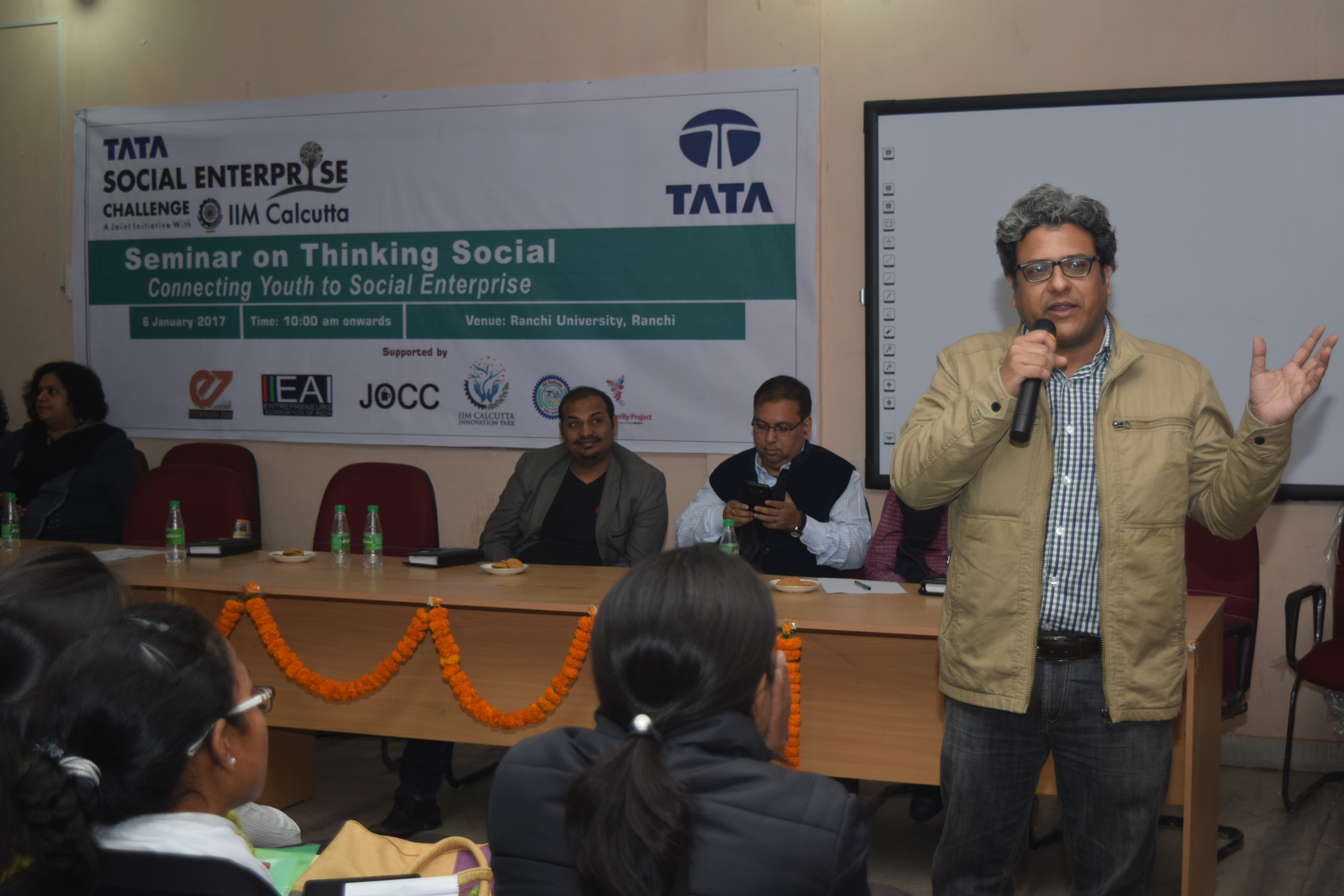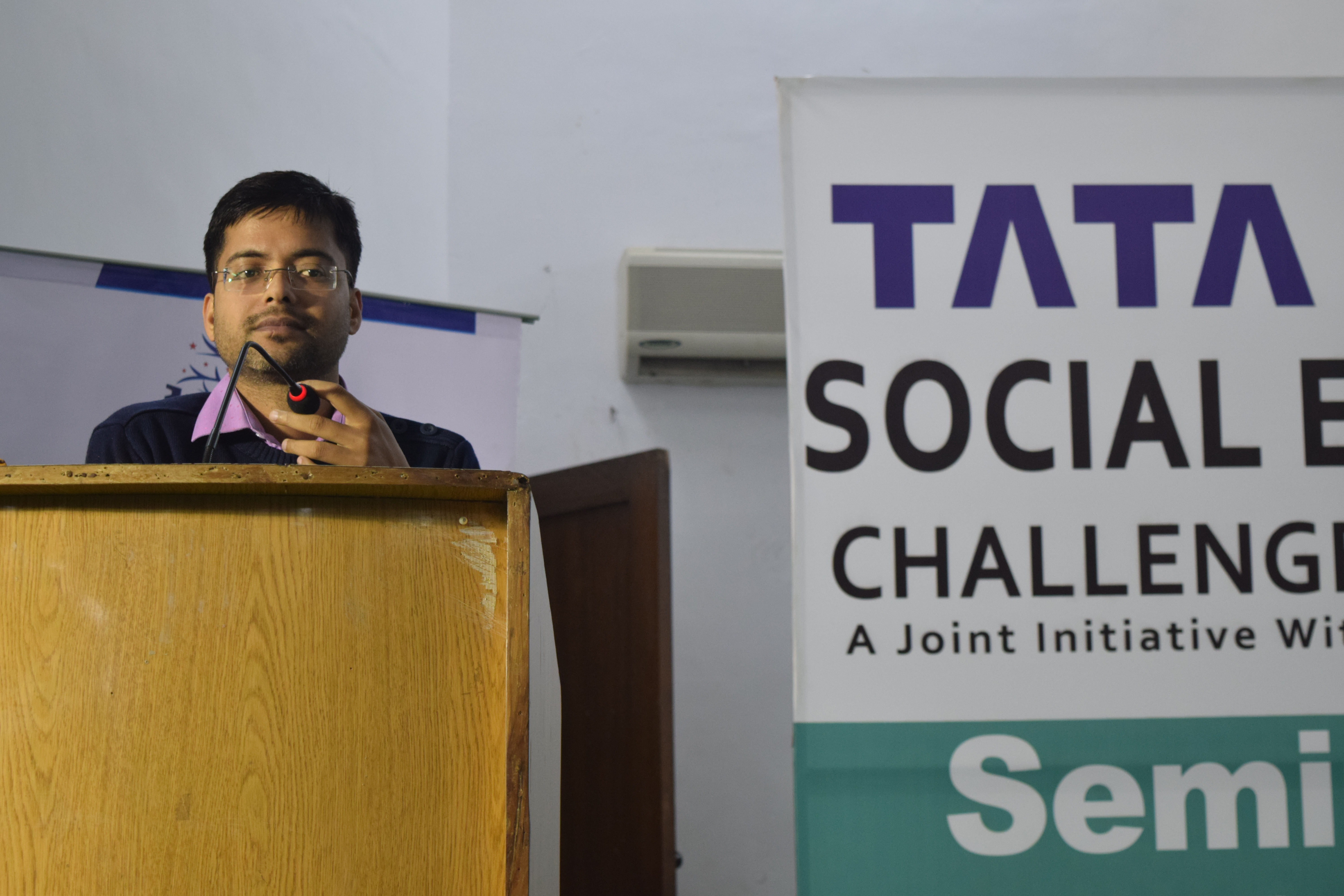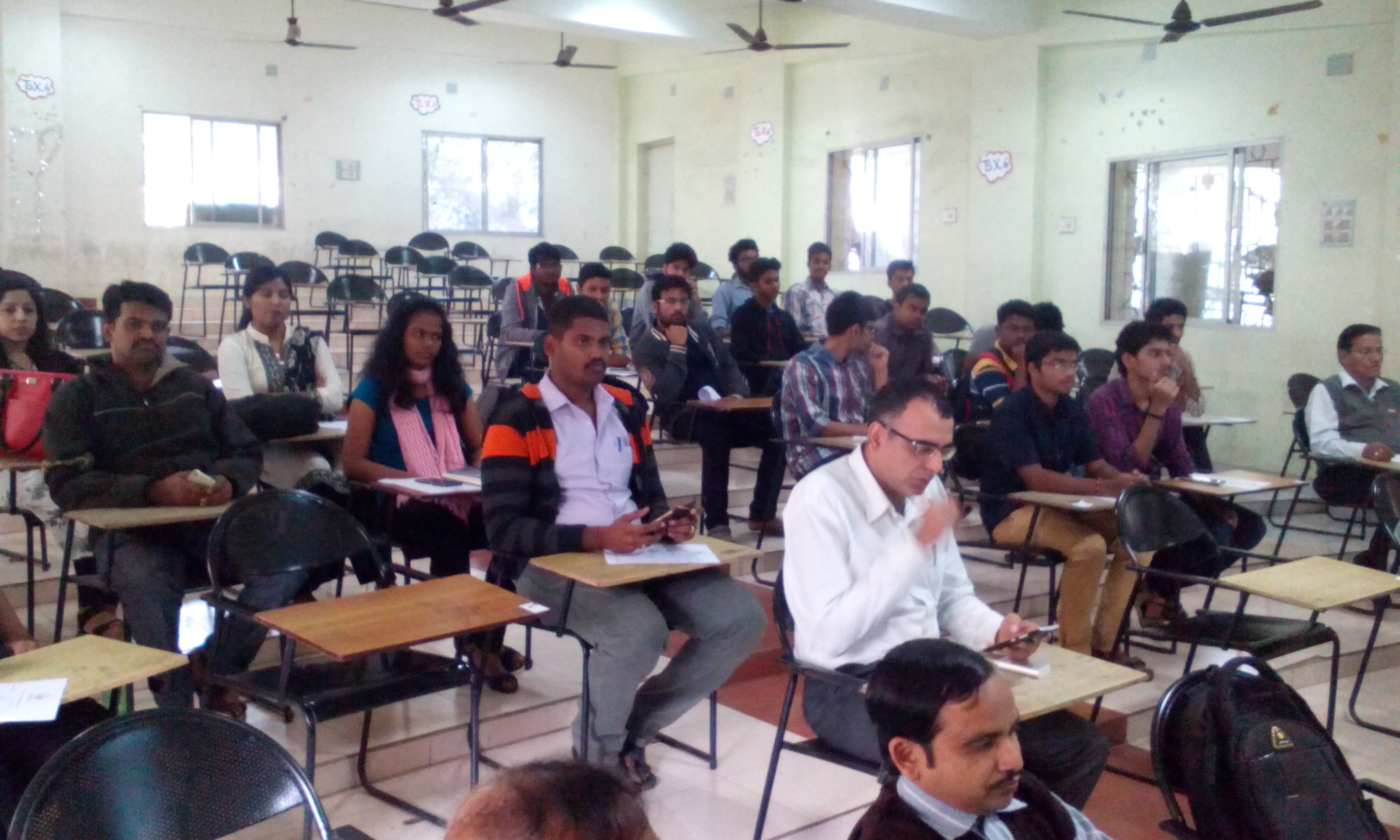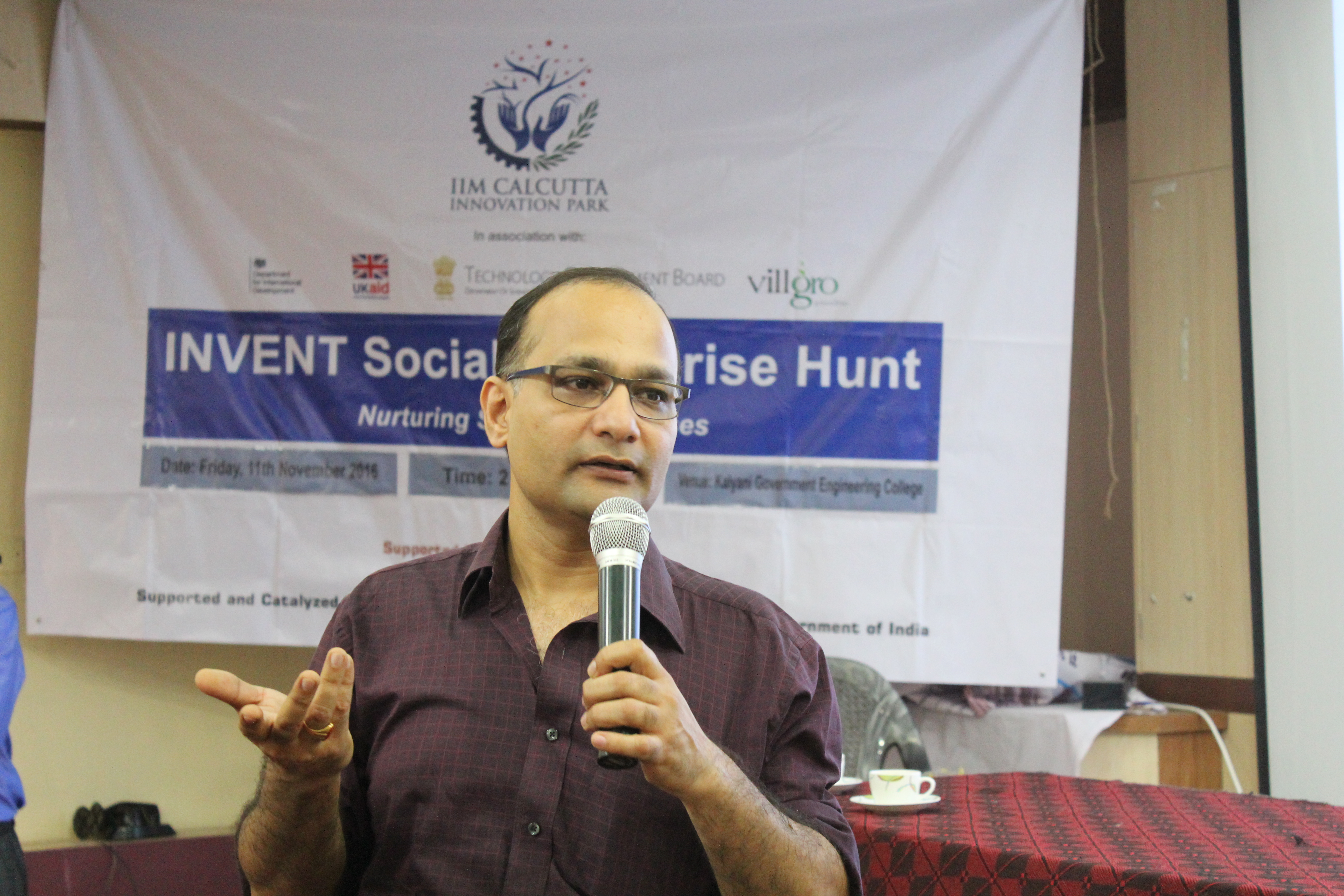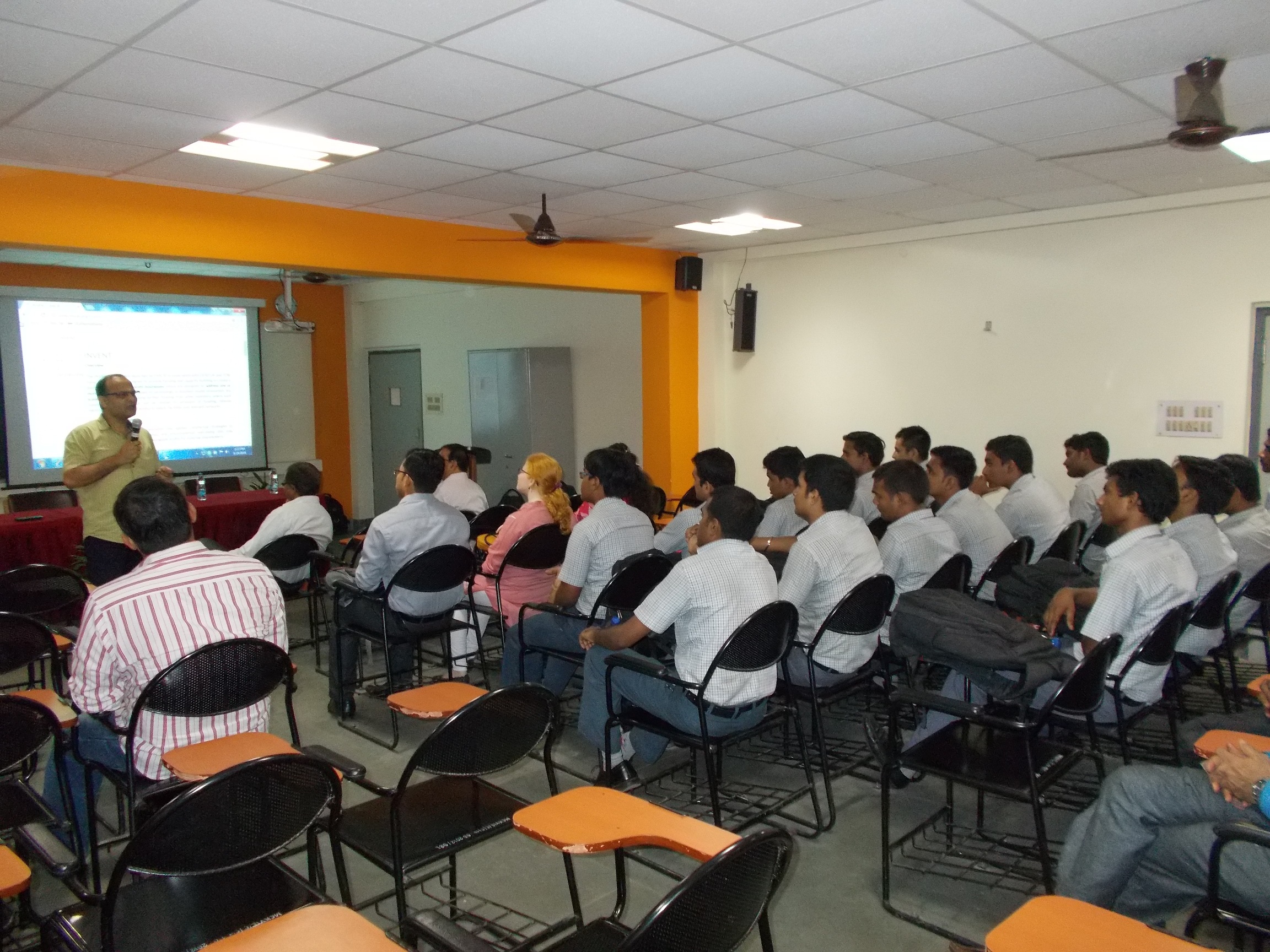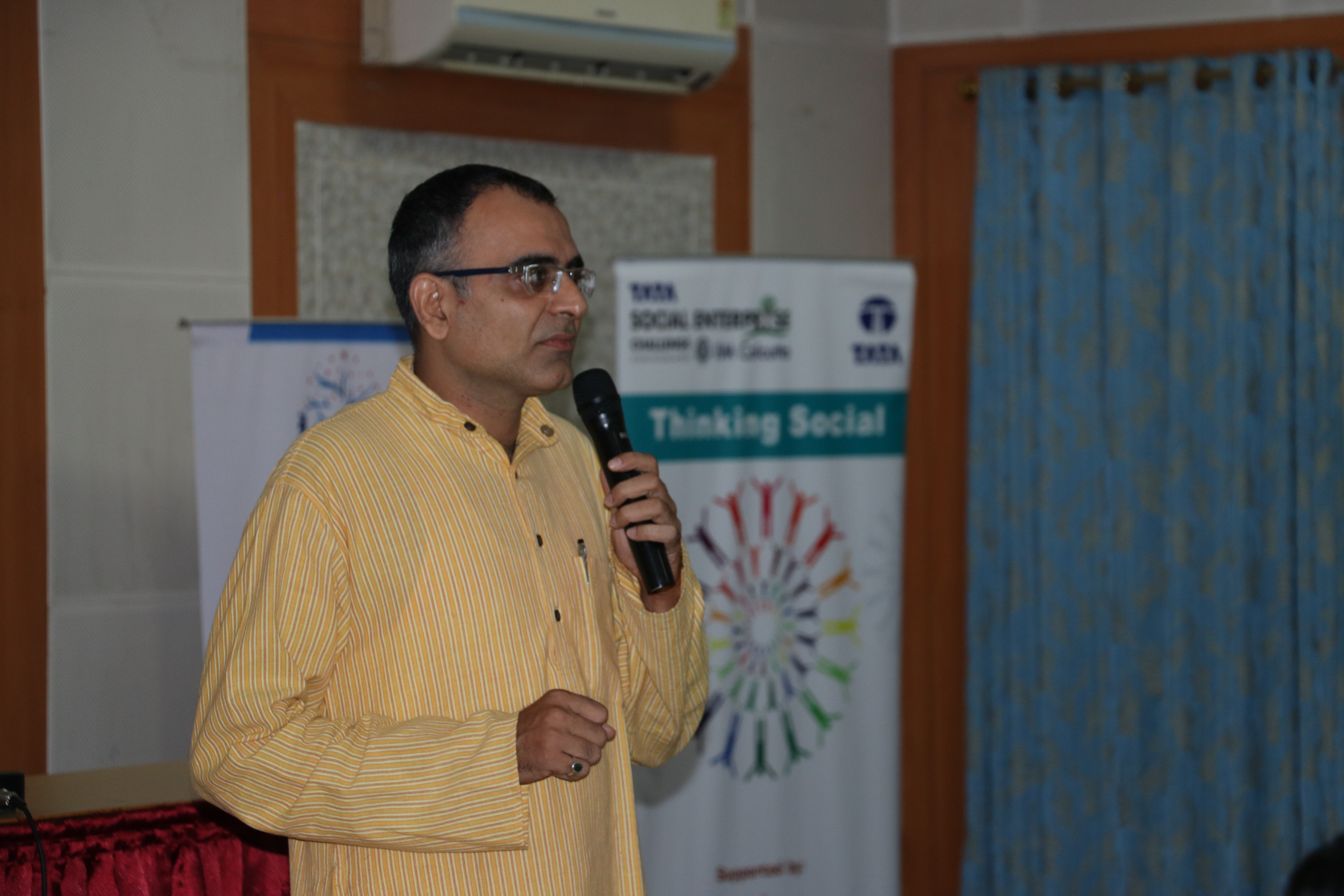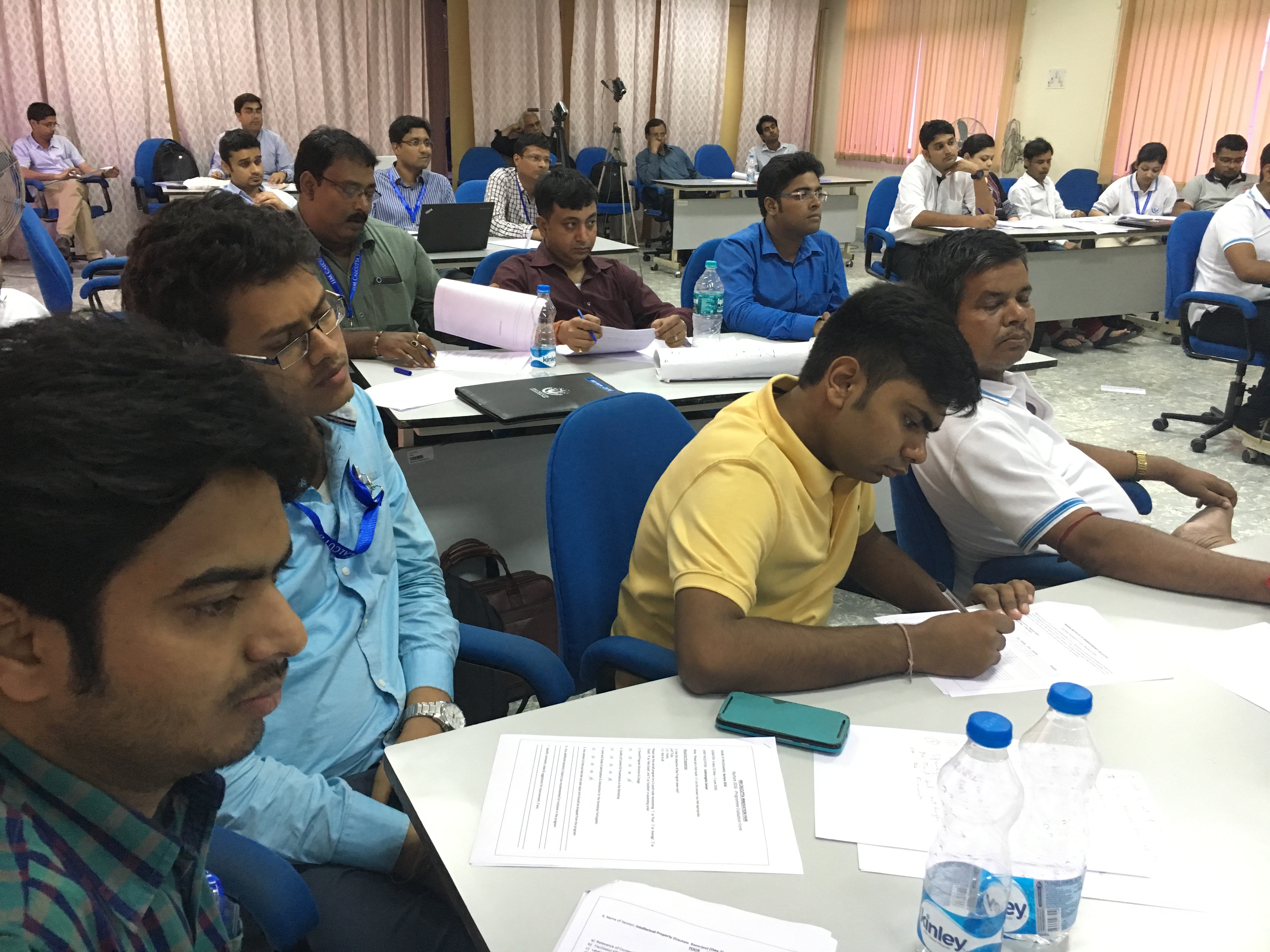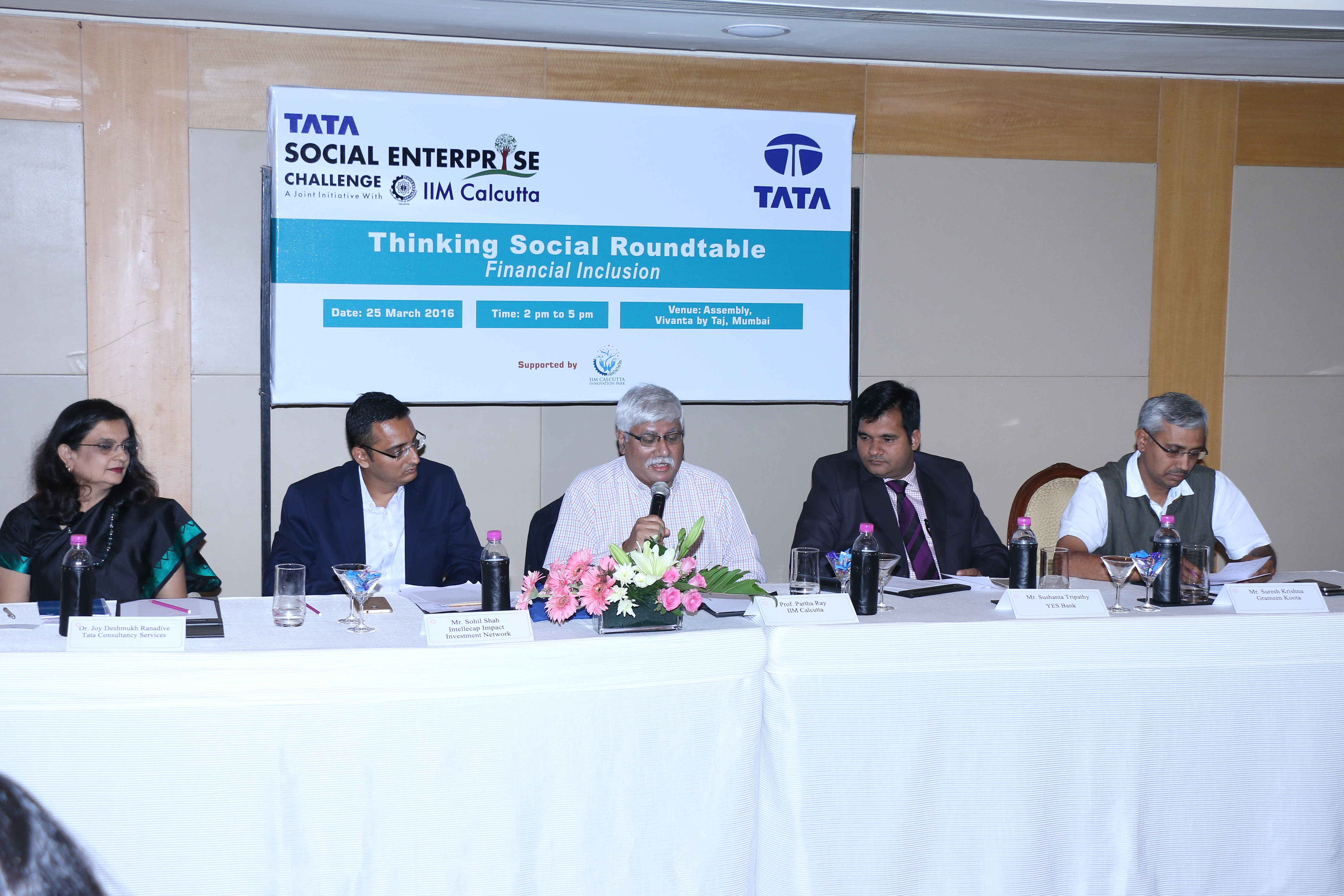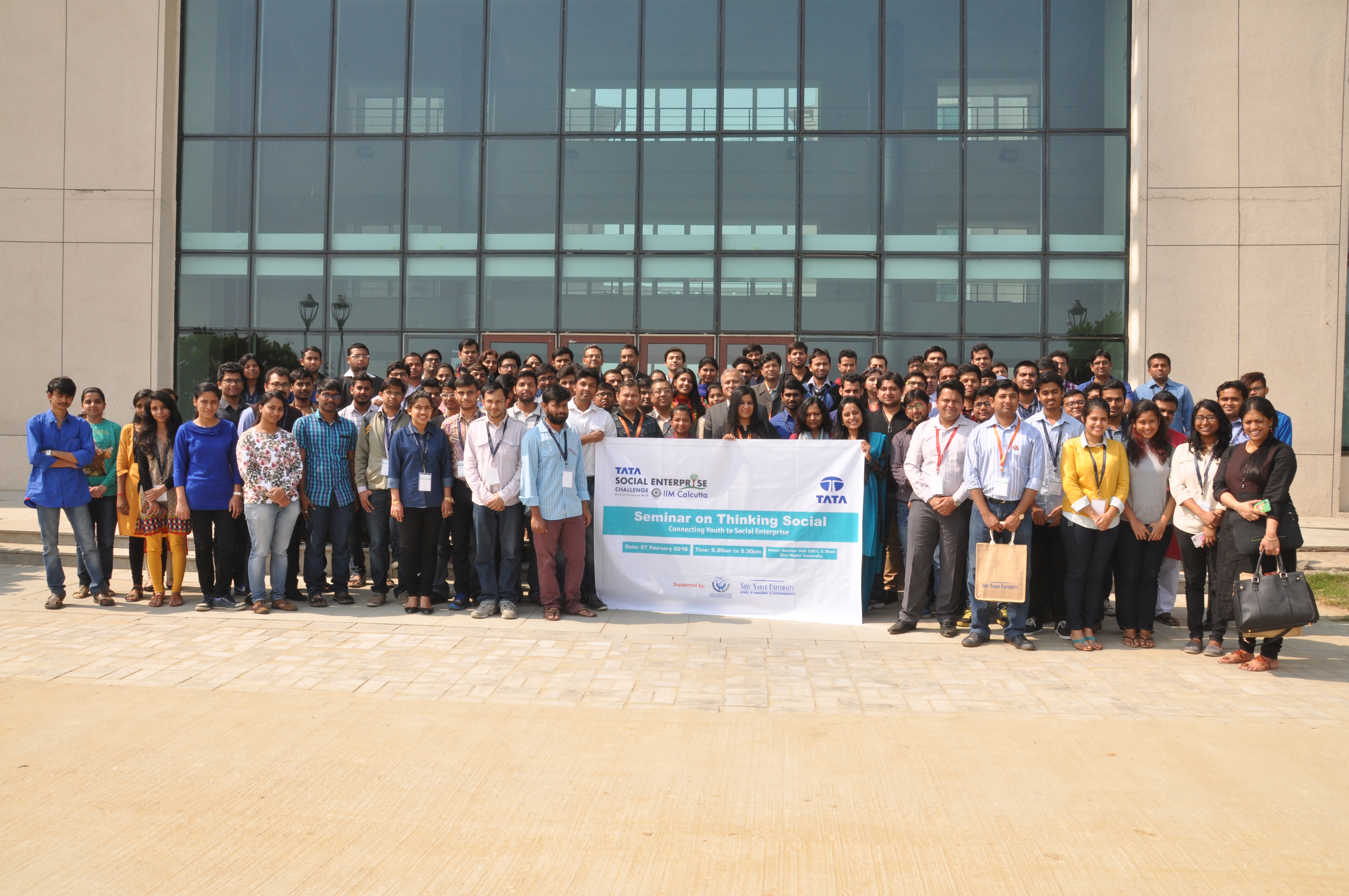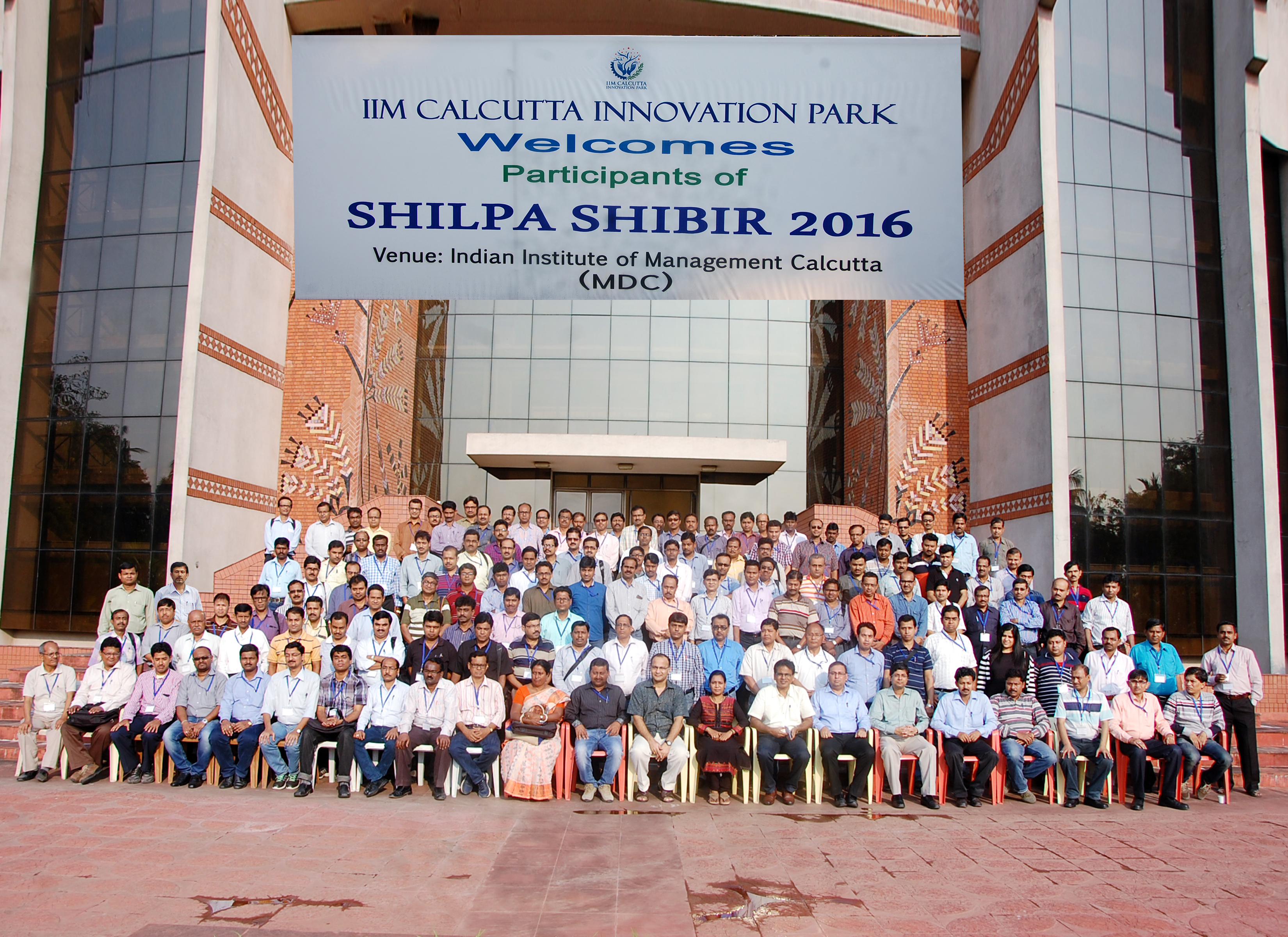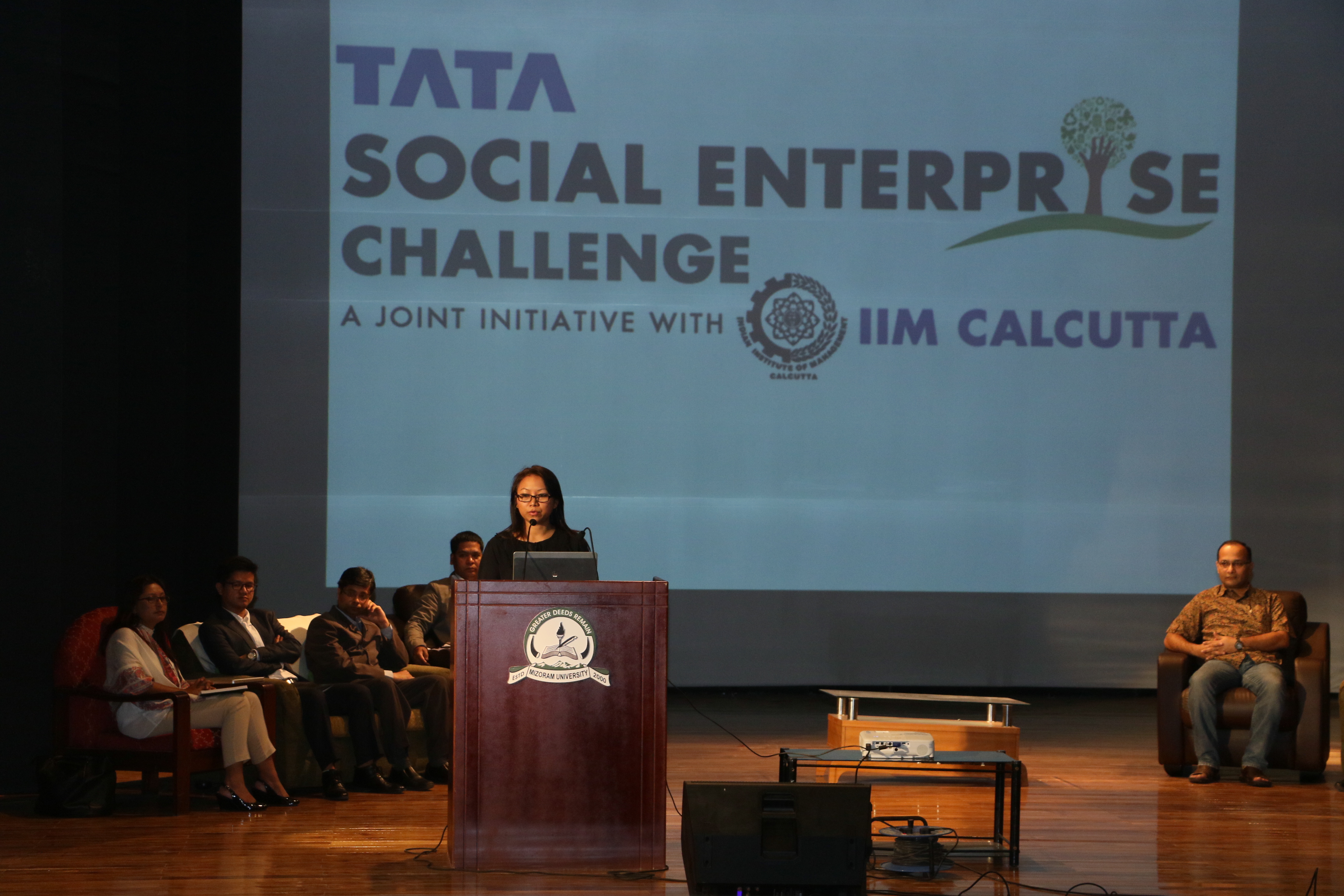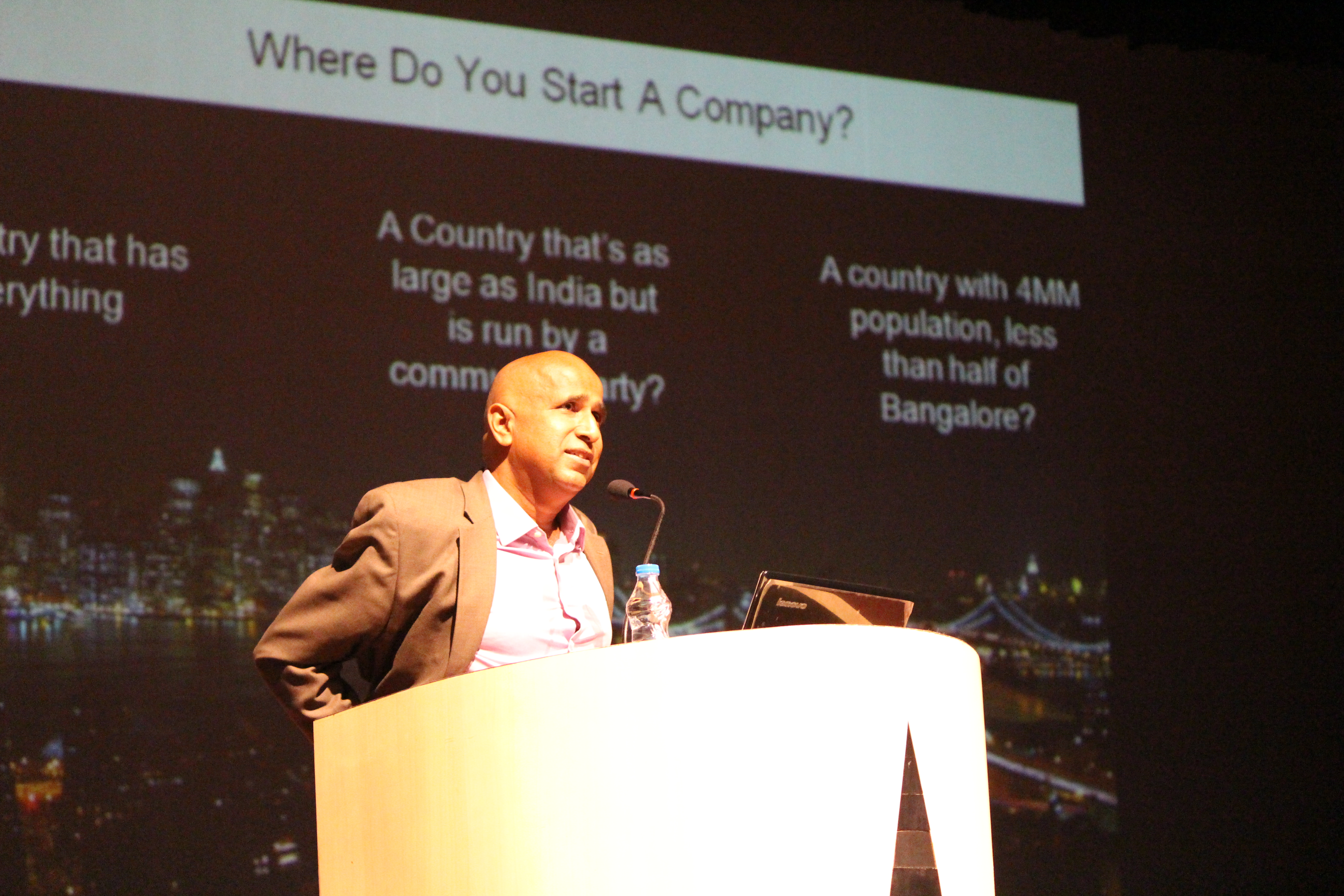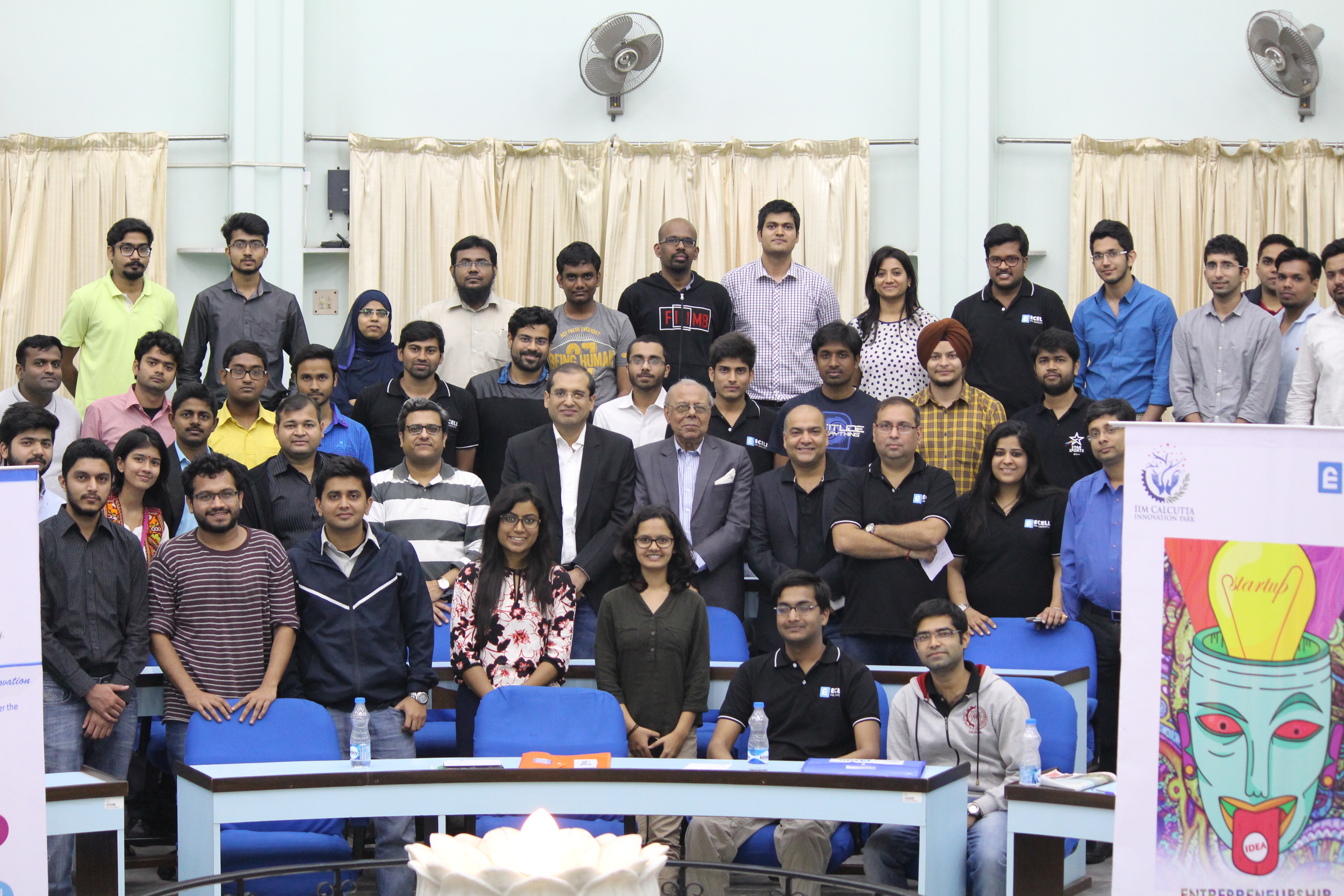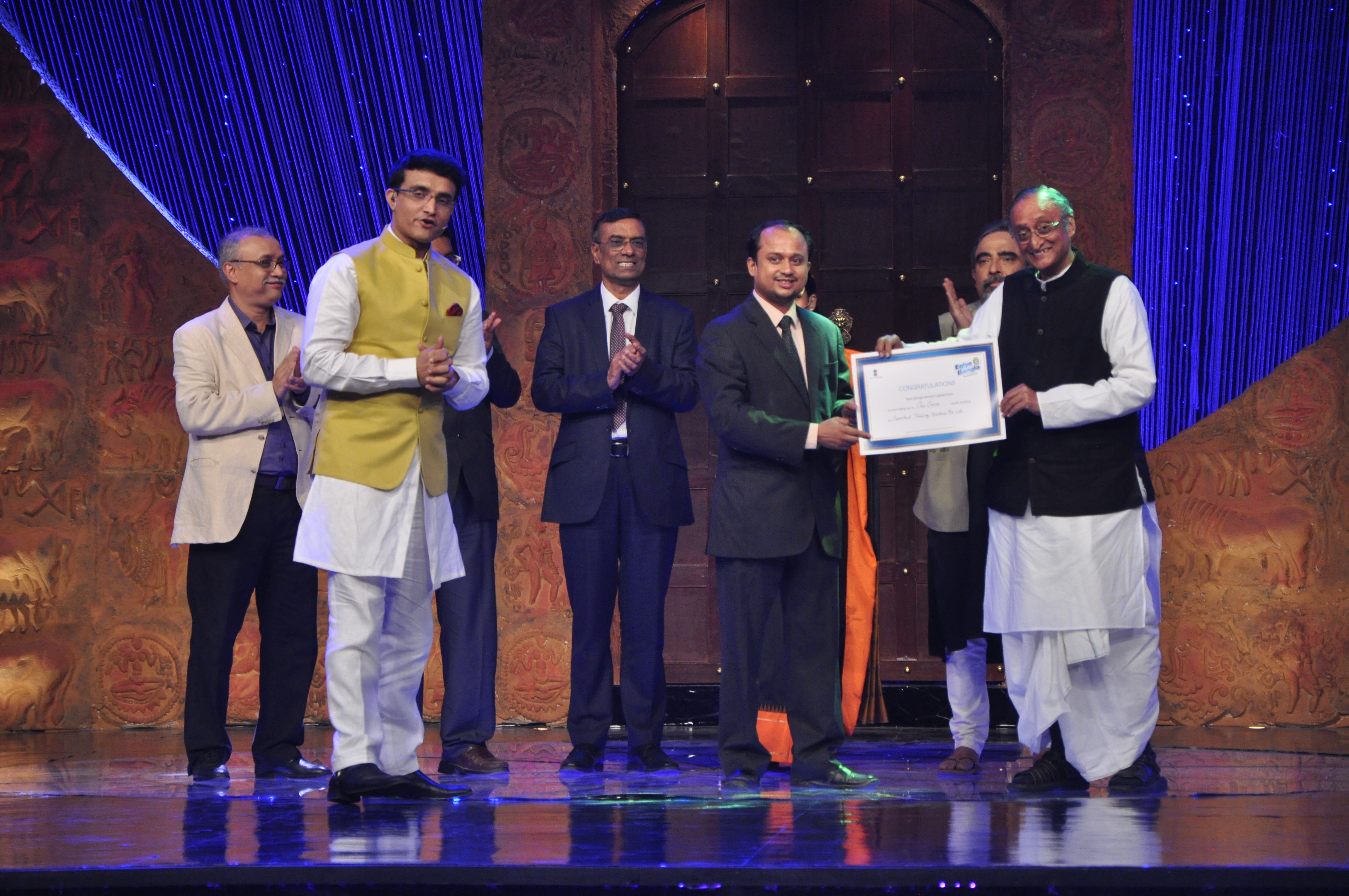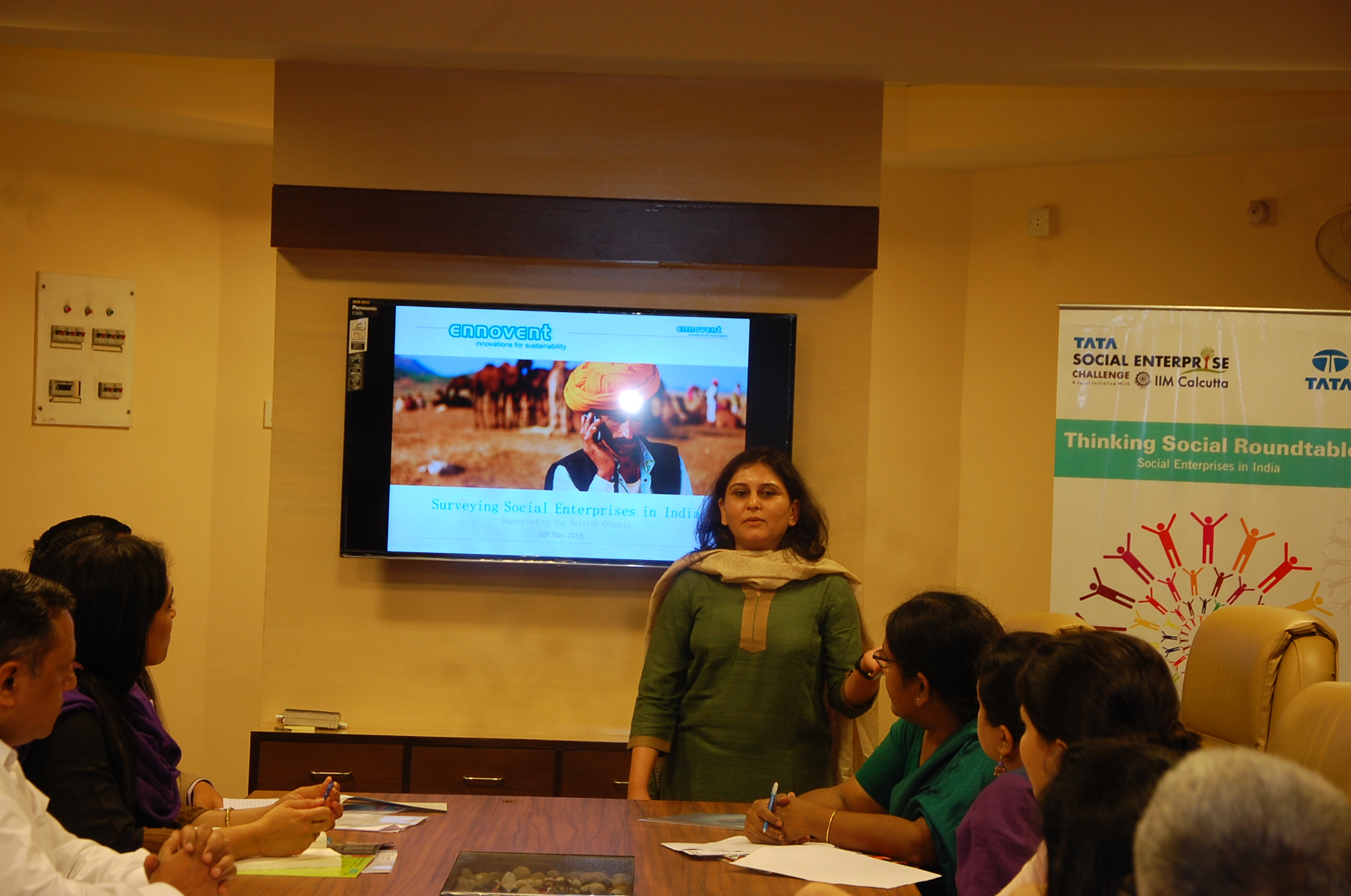Events
Thinking Social Seminar at Ranchi University
IIM Calcutta Innovation Park in association with the Tata group and Entrepreneurs Association of India (EAI), Jharkhand Open Coffee Club (JoCC) a group of Jharkhand-based entrepreneurs hosted the ‘Thinking Social Seminar’ at Institute of Management Studies, Ranchi University on January 6, 2017. The primary objective of this event was to build awareness on social entrepreneurship, generate interest and inspire the young generation to come up with innovative solutions to social challenges. The speakers of the seminar comprised of eminent and social entrepreneurs, investors and academicians, who have already established their own outstanding ventures and have impacted the lives of thousands of people.
The day-long seminar sought to introduce entrepreneurs from Jharkhand to the spirit of social entrepreneurship in a rapidly evolving global economy and addressed the concerns of young, budding entrepreneurs in Jharkhand. The speakers for the day comprised eminent social entrepreneurs, from Bihar and Jharkhand who have been working extensively in the Indian social entrepreneurship space.
The Seminar was formally inaugurated by Dr. R. K. Pandey, Vice Chancellor, Ranchi University. In his opening address, Dr. Pandey emphasized on the need of social entrepreneurs for development of society not only in Jharkhand, but all across the world. This was followed by an inaugural address by Mr. Shailesh Verma – Chief Resident Executive, Tata Steel Limited, Ranchi, who explained the objectives of the seminar and the how Tata group has played an active role to foster entrepreneurship in the country.
Mr. Subhrangshu Sanyal, CEO – IIM Calcutta Innovation Park spoke about the need for social entrepreneurship in our country and why the youth should be involved in it. He also mentioned about the essential qualities which a social entrepreneur should possess in order to succeed.
Mr. Vikram Duggal, who represented US based Founder Institute and Unitus Seed Fund
in Kolkata, spoke about Unitus Seed Fund which is India’s leading venture fund investing in startups innovating for the masses. Mr. Duggal explained how Unitus Seed Fund, helps startups “prepare for growth” via seed funding, strategic and operating support, providing critical connections, and securing growth capital. The investment focus areas of Unitus are healthcare, education, and financial technology.
Ms. Malavika Sharma, Founder Avikaonline and also an ex-alumnus of XLRI, Jamshedpur explained how the Butterfly project would help create a network of women entrepreneurs. Ms. Sharma said that the project is aimed to inspire women with offbeat business ideas because we mostly see them venturing in the beauty parlour and handicraft businesses. Recently a workshop with a focus on how to start a business and how to raise funds – which are issues that plague every budding entrepreneur – has been held in association with the US Consulate for the entrepreneurs from Jharkhand. The Butterfly project has already tied up with 25 men and women who have passed out from renowned business schools and have been successful as entrepreneurs.
Mr. Roshan Sharma, Co- founder of Drinksbecho shared his journey as an entrepreneur and how his venture drinksbecho.com has now become an e-commerce portal for beverages industry, being run and powered by a company called VrTechsys Solutions Pvt. Ltd. with experience of industry in the field of new product development from Idea, Concept to making in the real world in product industries.
The post lunch session started with 12 pitches from various entrepreneurs to a panel of judges whose ideas and prototypes were shortlisted by Bihar Entrepreneurs Association (BEA). To inculcate the young minds BEA had organized the Pitch4Jharkahnd, a startup competition for which the entries were invited from Jharkhand for the best business ideas. There were many challenging business proposals from the participants to address the problems in various sectors like: agriculture, water and sanitation, clean energy, e-commerce solutions, healthcare services, and other social problems of society.
Mr. Abhishek Kumar, Secretary General, Bihar Entrepreneurs Association (BEA), spoke of the role of BEA to promote social entrepreneurship across the country. BEA was founded by young Entrepreneurs from the state in 2011, to provide a platform for new enterprise, startups and potential entrepreneurs from within the state to establish a successful business and with the holistic aim to make Bihar into “Enterprising Bihar” by creating an industry and entrepreneur friendly eco-system in the state and build a pool of entrepreneurs for the future. BEA offers an excellent platform for future entrepreneurs, where one prospective entrepreneur can get a single window service from advisory services to fund raising support.
The session ended with a vote of thanks from Director of Management Studies, Ranchi University to all the speakers and the participants. He accentuated that the objective of the seminar was to create and promote entrepreneurship at the grassroots level starting from village and district level and inculcate innovation and social change drivers in young minds. The Government of Jharkhand is taking firm and fundamental strides towards building a robust and friendly ecosystem which promotes innovation and nurtures entrepreneurship skills and the Government is committed to provide opportunities to every strata of society by empowering an equitable ecosystem for development of entrepreneurship and innovation.
Read MoreThinking Social Seminar – Patna
Tata Social Enterprise Challenge (TSEC) – a joint initiative of the Tata group and the Indian Institute of Management Calcutta (IIMC) held the third seminar FY 2016-17, ‘Thinking Social’, at DNS Regional Institute of Cooperative Management, Patna in partnership with IIM Calcutta Innovation Park and Bihar Entrepreneurs Association (BEA) on 17 December 2016. The day-long seminar sought to introduce entrepreneurs from Bihar to the spirit of social entrepreneurship in a rapidly evolving global economy and addressed the concerns of young, budding entrepreneurs in Bihar. The speakers for the day comprised eminent social entrepreneurs, from Bihar and Bengal who have been working extensively in the Indian social entrepreneurship space.
The seminar was formally inaugurated by Mr. K.P. Ranjan, Director – DNS Regional Institute of Cooperative Management. In his opening address Mr. Ranjan emphasized on the need of social entrepreneurs for development of society not only in Patna but all across the world. This was followed by an inaugural address by Mr. Abhishek Kumar, Secretary General – Bihar Entrepreneurs Association (BEA) who welcomed all the eminent speakers and explained the objectives of the seminar and how BEA has played an active role to foster entrepreneurship in Bihar.
Bihar Entrepreneurs Association was founded by young entrepreneurs from the state in 2011 to provide a platform for new enterprises, start ups and potential entrepreneurs from the state to establish a successful business and with the holistic aim of re-making Bihar as “Enterprising Bihar” by creating an industry and entrepreneur friendly eco-system in the state and building a pool of entrepreneurs for the future. BEA offers an excellent platform for future entrepreneurs, where a prospective entrepreneur can get a single window service, from advisory services to fund raising support.
Mr. Subhrangshu Sanyal, CEO – IIM Calcutta Innovation Park spoke about the need for social entrepreneurship in our country and why the youth should be involved in it. He also mentioned the essential qualities which a social entrepreneur should have.
Mr. Anuj Kumar, Co-founder – Kaushalya Foundation shared with the audience the vision of his venture and spoke about the work which they are doing in Bihar. He mentioned that Kaushalya Foundation (KF), a non-government, non-profit organization works with rural and urban poor engaged in agriculture and the food sector in an environment-friendly and gender-sensitive manner. KF has impacted more than 10,000 smallholders and the poor, addressing the regressive issues pertaining to their livelihoods, education, gender-relations, health, nutrition and environmental-solidarity.
Mr. Gaurav Kapoor, Director – Innokul highlighted the societal challenges of India in the fields of Sanitation and Education. He also spoke about ‘Wello’, a social venture with a bold mission – to deliver clean water to the thirsty world. He also cited the examples of other social enterprises that are working with the village community to reduce the dropout rates of the girl child
Mr. Shashank Kumar, Co-founder – Farm n Farmers shared his experience of a being a successful social entrepreneur. He spoke about how Farm n Farmers (FnF) has minimized the uncertainty and mental trauma of the small and marginal farmers and helped maximize the farmer’s revenue by use of innovative ways of farming by providing support resources offered by the government. FnF has impacted 15,000 farmers over the last 5 years, through its local centers which are situated in villages, run by micro-entrepreneurs, trained and guided by FnF.
Mr. Suman Mukhopadhyay, Director – Banglanatak.com shared his journey as a social entrepreneur, the ways to overcome such challenges and how banglanatak.com works with a mission to foster pro-poor growth and safeguard our intangible cultural heritage, through the usage of culture-based approaches for community education and empowerment.
The post lunch session started with 10 pitches from various entrepreneurs to a panel of judges whose ideas and prototypes were shortlisted by BEA. To inculcate the young minds (BEA) had organized the Pitch4Bihar a startup competition for which the entries were invited from the country for the best business ideas. There were many challenging business proposals from the participants to address the problems in various sectors like: agriculture, e-commerce solutions, career counseling, healthcare services, education and other social problems of society.
The session ended with a vote of thanks from Mr. Abhishek Kumar, Secretary General, to all the speakers and the participants. He accentuated that the objective of BEA is to create and promote entrepreneurship at the grassroots level starting from village and district level and inculcate innovation and social change drivers in young minds. The Government of Bihar has already launched the Start up policy and has also earmarked a Venture Capital fund of Rs 500 crore for startups. BEA and Information Technology Department have also agreed upon setting up a 50,000 sq.ft office space for startups in the State capital and is currently looking to partner with institutes/enterprises to hold Start up Yatras all across the country and Bihar to achieve the objective of “Making an Enterprising Bihar”.
INVENT outreach at NIT Durgapur
Fourth outreach programme by INVENT-IIMCIP was held at National Institute of Technology, Durgapur on Wednesday, November 30, 2016. There were about 45 participants including students, Faculty members and research associates from different colleges of Burdwan District, Durgapur & Asansol (West Bengal) and some entrepreneurs from the surrounding area. The programme began with a welcome note addressed to IIMCIP delegates by E-Cell head coordinator of NIT Durgapur. This was followed by speech and presentation giving an overview of INVENT and exploring essential topic like ‘Ideation & Creating Business Plan’, by the members of IIMCIP. Mr Gaurav Kapoor, Executive Director, Innokul, discussed an interesting topic, ‘Support Ecosystem by Start ups’. The audience were highly engaged in the programme and actively participated in the interactive & motivating session conducted by Mr Gaurav Kapoor. The programme was a grand success and acquired positive responses from enthusiastic entrepreneurs.
Read MoreThinking Social Seminar at Patna – 17 December 2016
Tata Social Enterprise Challenge (TSEC) – a joint initiative of the Tata group and the Indian Institute of Management Calcutta (IIMC) held the third seminar FY 2016-17, ‘Thinking Social’, at DNS Regional Institute of Cooperative Management, Patna in partnership with IIM Calcutta Innovation Park and Bihar Entrepreneurs Association (BEA) on 17 December 2016. The day-long seminar sought to introduce entrepreneurs from Bihar to the spirit of social entrepreneurship in a rapidly evolving global economy and addressed the concerns of young, budding entrepreneurs in Bihar. The speakers for the day comprised eminent social entrepreneurs, from Bihar and Bengal who have been working extensively in the Indian social entrepreneurship space.
The seminar was formally inaugurated by Mr. K.P. Ranjan, Director – DNS Regional Institute of Cooperative Management. In his opening address Mr. Ranjan emphasized on the need of social entrepreneurs for development of society not only in Patna but all across the world. This was followed by an inaugural address by Mr. Abhishek Kumar, Secretary General – Bihar Entrepreneurs Association (BEA) who welcomed all the eminent speakers and explained the objectives of the seminar and how BEA has played an active role to foster entrepreneurship in Bihar.
Bihar Entrepreneurs Association was founded by young entrepreneurs from the state in 2011 to provide a platform for new enterprises, start ups and potential entrepreneurs from the state to establish a successful business and with the holistic aim of re-making Bihar as “Enterprising Bihar” by creating an industry and entrepreneur friendly eco-system in the state and building a pool of entrepreneurs for the future. BEA offers an excellent platform for future entrepreneurs, where a prospective entrepreneur can get a single window service, from advisory services to fund raising support.
Mr. Subhrangshu Sanyal, CEO – IIM Calcutta Innovation Park spoke about the need for social entrepreneurship in our country and why the youth should be involved in it. He also mentioned the essential qualities which a social entrepreneur should have.
Mr. Anuj Kumar, Co-founder – Kaushalya Foundation shared with the audience the vision of his venture and spoke about the work which they are doing in Bihar. He mentioned that Kaushalya Foundation (KF), a non-government, non-profit organization works with rural and urban poor engaged in agriculture and the food sector in an environment-friendly and gender-sensitive manner. KF has impacted more than 10,000 smallholders and the poor, addressing the regressive issues pertaining to their livelihoods, education, gender-relations, health, nutrition and environmental-solidarity.
Mr. Gaurav Kapoor, Director – Innokul highlighted the societal challenges of India in the fields of Sanitation and Education. He also spoke about ‘Wello’, a social venture with a bold mission – to deliver clean water to the thirsty world. He also cited the examples of other social enterprises that are working with the village community to reduce the dropout rates of the girl child
Mr. Shashank Kumar, Co-founder – Farm n Farmers shared his experience of a being a successful social entrepreneur. He spoke about how Farm n Farmers (FnF) has minimized the uncertainty and mental trauma of the small and marginal farmers and helped maximize the farmer’s revenue by use of innovative ways of farming by providing support resources offered by the government. FnF has impacted 15,000 farmers over the last 5 years, through its local centers which are situated in villages, run by micro-entrepreneurs, trained and guided by FnF.
Mr. Suman Mukhopadhyay, Director – Banglanatak.com shared his journey as a social entrepreneur, the ways to overcome such challenges and how banglanatak.com works with a mission to foster pro-poor growth and safeguard our intangible cultural heritage, through the usage of culture-based approaches for community education and empowerment.
The post lunch session started with 10 pitches from various entrepreneurs to a panel of judges whose ideas and prototypes were shortlisted by BEA. To inculcate the young minds (BEA) had organized the Pitch4Bihar a startup competition for which the entries were invited from the country for the best business ideas. There were many challenging business proposals from the participants to address the problems in various sectors like: agriculture, e-commerce solutions, career counseling, healthcare services, education and other social problems of society
The session ended with a vote of thanks from Mr. Abhishek Kumar, Secretary General, to all the speakers and the participants. He accentuated that the objective of BEA is to create and promote entrepreneurship at the grassroots level starting from village and district level and inculcate innovation and social change drivers in young minds. The Government of Bihar has already launched the Start up policy and has also earmarked a Venture Capital fund of Rs 500 crore for startups. BEA and Information Technology Department have also agreed upon setting up a 50,000 sq.ft office space for startups in the State capital and is currently looking to partner with institutes/enterprises to hold Start up Yatras all across the country and Bihar to achieve the objective of “Making an Enterprising Bihar”.
Read MoreINVENT: Seminar at Kalyani Government Engineering College
The third INVENT outreach programme took place at Kalyani Govt Engineering College (KGEC) auditorium on Friday, November 11, 2016. There were about 120 participants comprising final year students, Faculties and research associates from different colleges of Nadia District, West Bengal and also 5 entrepreneurs from the same district. The College administration, faculty and the E-cell team supported the event with lot of enthusiasm and whole-hearted co-operation. Prof K Chakraborty, Principal of KGEC, welcomed all the students and delegates and set the context through a short, inspiring speech. Mr Soujit Das , from IIMCIP explained the audience the objective of INVENT program and threw light on various aspects of Social Entrepreneurship. Mr. Debapratim Das from IIMCIP took the session on “Ideation & Creating Business Plan” for the budding entrepreneurs. The audience actively participated in the interactive session by Mr Suman Mukhopadhyay of Bangla Natok.Com on the topic “Support Ecosystem by Start ups “. This was followed by a 30-min Q&A session.
Read MoreThinking Social Seminar – Hyderabad (23 October 2016)
Tata Social Enterprise Challenge (TSEC) – a joint initiative of the Tata group and the Indian Institute of Management Calcutta (IIMC) held the second seminar FY 2016-17, ‘Thinking Social’, at IIIT Hyderabad in partnership with IIM Calcutta Innovation Park and iBHubs Hyderabad on 23 October 2016. The day-long seminar sought to introduce students from top professional colleges in India to the spirit of social entrepreneurship in a rapidly evolving global economy and addressed the concerns of young, budding entrepreneurs belonging to reputed institutes in Hyderabad. The speakers for the day comprised eminent social entrepreneurs, academicians and senior corporate executives working extensively in the Indian social entrepreneurship space.
The Seminar was formally inaugurated by Prof. Krishna Madhavi Kolla – Head of New Initiatives, IIIT Hyderabad. In her opening address she mentioned that IIIT Hyderabad has been working on the incubation space and have been supporting a number of startups for the past several years, not only in Hyderabad but all across the world. They also have an incubation programme called “Avishkar” which helps to identify startups and support them in their entrepreneurial journey.
Subhrangshu Sanyal, CEO – IIM Calcutta Innovation Park spoke about the need for social entrepreneurship in our country and why the youth should be involved in it. He also mentioned about the essential qualities which a social entrepreneur should have.
Manjuvani Nayani, Managing Trustee – Tata Projects Community Development shared with the audience the vision of the Tata group and spoke about the work which they are doing in that region. She mentioned, “Tata group is playing an important role in social development for the past many years and presently their focus here is on Water, Skills and Education. In the water sector Tata Projects has taken up a programme in social entrepreneurship which is a bankable and replicable model. Through this programme they are developing entrepreneurs to provide safe drinking water to the rural community.”
Ramana Gogula, CEO & Founder – Earthen Glow spoke about his venture and how it is creating a social impact. Earthen Glow is a Clean Technology Start-Up that focuses on building robust & scalable OFFGRID Lighting Solutions to enable rural households to gradually decrease their dependency on kerosene. He motivated the students and encouraged them to become social entrepreneurs by saying, “A journey of a social entrepreneur is difficult but the experience is very rewarding.”
Prof. P. K. Reddy – IIIT Hyderabad and founder at eSagu gave a brief about his venture and how it is very useful to the farmers. eSagu is an IT-based personalized agro-advisory system which aims to improve farm productivity by delivering high quality personalized (farm-specific) agro-expert advice in a timely manner to each farm at the farmer’s door-steps. He concluded by saying that his greater objective is to scale his venture all over India and to other countries which are in a similar state as India.
Mukhti K Bosco, Founder – Healing Fields Foundation mentioned that India is still backward in a large number of areas – healthcare being one of the major areas of concern. She spoke about how her venture is creating an impact in the society. Healing Fields Foundation – a pioneer in the areas of health financing and community education – is dedicated to making healthcare affordable and accessible to all underprivileged and marginalized people across India. In her concluding remarks she urged the audience to take up social entrepreneurship as a career option and said that, “It takes passion which motivates one to work in underdeveloped geographical regions.”
Raj Janagam, Managing Partner – HelloBhayya Services, spoke about his entrepreneurship journey and gave an in-depth insight to the audience about how to take their idea to the next level. He urged the young students to take up their idea while they are studying so that by the time they finish college their prototype would be ready. He also mentioned about the funding options of startups in the social enterprise sector.
Satish Kumar Burra, Founder – Organic Thali, narrated his journey as a social entrepreneur and what motivated him to start his venture. He said, “I lost my elder brother to cancer and I discovered the main reason for this was the pesticides which are being used in the crops by farmers.” This motivated him to come up with a solution to this problem and he founded Organic Thali which provides pesticides/chemical free food. They currently serve to more than 1000 customer’s everyday in Hyderabad. Satish is helping farmers to improve their conditions and is also generating employment to the youth.
Rambabu Kondru from iBHubs Hyderabad spoke about how iBHubs – a Pan-India startups hub – provides end-to-end assistance to startups. He also mentioned that at iB Hubs, equal importance is given to Purpose Driven Social Enterprises and NGOs as well as Profit Driven Enterprises.
Concluding on a positive note, the seminar left the audience inspired by the various stories of change and impact shared enthusiastically by the speakers for the day. A sentiment that was a commonly shared among the participants and the speakers was the innate requirement for social entrepreneurs and the change that they can bring to society, and that such seminars are a vital platform in ushering in that change.
Read MoreThinking Social Seminar – IIIT Hyderabad
Tata Social Enterprise Challenge (TSEC) – a joint initiative of the Tata group and the Indian Institute of Management Calcutta (IIMC) held the second seminar FY 2016-17, ‘Thinking Social’, at IIIT Hyderabad in partnership with IIM Calcutta Innovation Park and iBHubs Hyderabad on 23 October 2016. The day-long seminar sought to introduce students from top professional colleges in India to the spirit of social entrepreneurship in a rapidly evolving global economy and addressed the concerns of young, budding entrepreneurs belonging to reputed institutes in Hyderabad. The speakers for the day comprised eminent social entrepreneurs, academicians and senior corporate executives working extensively in the Indian social entrepreneurship space.
The Seminar was formally inaugurated by Prof. Krishna Madhavi Kolla – Head of New Initiatives, IIIT Hyderabad. In her opening address she mentioned that IIIT Hyderabad has been working on the incubation space and have been supporting a number of startups for the past several years, not only in Hyderabad but all across the world. They also have an incubation programme called “Avishkar” which helps to identify startups and support them in their entrepreneurial journey.
Subhrangshu Sanyal, CEO – IIM Calcutta Innovation Park spoke about the need for social entrepreneurship in our country and why the youth should be involved in it. He also mentioned about the essential qualities which a social entrepreneur should have.
Manjuvani Nayani, Managing Trustee – Tata Projects Community Development shared with the audience the vision of the Tata group and spoke about the work which they are doing in that region. She mentioned, “Tata group is playing an important role in social development for the past many years and presently their focus here is on Water, Skills and Education. In the water sector Tata Projects has taken up a programme in social entrepreneurship which is a bankable and replicable model. Through this programme they are developing entrepreneurs to provide safe drinking water to the rural community.”
Ramana Gogula, CEO & Founder – Earthen Glow spoke about his venture and how it is creating a social impact. Earthen Glow is a Clean Technology Start-Up that focuses on building robust & scalable OFFGRID Lighting Solutions to enable rural households to gradually decrease their dependency on kerosene. He motivated the students and encouraged them to become social entrepreneurs by saying, “A journey of a social entrepreneur is difficult but the experience is very rewarding.”
Prof. P. K. Reddy – IIIT Hyderabad and founder at eSagu gave a brief about his venture and how it is very useful to the farmers. eSagu is an IT-based personalized agro-advisory system which aims to improve farm productivity by delivering high quality personalized (farm-specific) agro-expert advice in a timely manner to each farm at the farmer’s door-steps. He concluded by saying that his greater objective is to scale his venture all over India and to other countries which are in a similar state as India.
Mukhti K Bosco, Founder – Healing Fields Foundation mentioned that India is still backward in a large number of areas – healthcare being one of the major areas of concern. She spoke about how her venture is creating an impact in the society. Healing Fields Foundation – a pioneer in the areas of health financing and community education – is dedicated to making healthcare affordable and accessible to all underprivileged and marginalized people across India. In her concluding remarks she urged the audience to take up social entrepreneurship as a career option and said that, “It takes passion which motivates one to work in underdeveloped geographical regions.”
Raj Janagam, Managing Partner – HelloBhayya Services, spoke about his entrepreneurship journey and gave an in-depth insight to the audience about how to take their idea to the next level. He urged the young students to take up their idea while they are studying so that by the time they finish college their prototype would be ready. He also mentioned about the funding options of startups in the social enterprise sector.
Satish Kumar Burra, Founder – Organic Thali, narrated his journey as a social entrepreneur and what motivated him to start his venture. He said, “I lost my elder brother to cancer and I discovered the main reason for this was the pesticides which are being used in the crops by farmers.” This motivated him to come up with a solution to this problem and he founded Organic Thali which provides pesticides/chemical free food. They currently serve to more than 1000 customer’s everyday in Hyderabad. Satish is helping farmers to improve their conditions and is also generating employment to the youth.
Rambabu Kondru from iBHubs Hyderabad spoke about how iBHubs – a Pan-India startups hub – provides end-to-end assistance to startups. He also mentioned that at iB Hubs, equal importance is given to Purpose Driven Social Enterprises and NGOs as well as Profit Driven Enterprises.
Concluding on a positive note, the seminar left the audience inspired by the various stories of change and impact shared enthusiastically by the speakers for the day. A sentiment that was a commonly shared among the participants and the speakers was the innate requirement for social entrepreneurs and the change that they can bring to society, and that such seminars are a vital platform in ushering in that change.
Read MoreINVENT: Seminar at MCKV Engineering College – Howrah
First Outreach event of Invent took place at Howrah, a traditional SME hub of West Bengal. MCKV Engineering College, a reputed institution that encourages entrepreneurship among the students, was chosen as the venue. The audience of about 45-50 heads comprised a mix of students of technical institutes in adjoining areas, entrepreneurs in SME sector, aspiring entrepreneurs and faculty from Engineering & Management Colleges. Debapratim, on behalf of IIMCIP, welcomed the participants at the outset and explained the objective of the Invent program and touched on the idea of social entrepreneurship, differences with traditional business and the impact a social entrepreneur can make to the lives of low income group people and to the society for a better living. Suman Mukhopadhyay, Director, Banglanatak.com, a social enterprise and an experienced social entrepreneur himself, then shared his experience on various projects where income-generating business ventures are addressing the need of common people. He also spoke on the challenges faced by a social entrepreneur in scaling up their business, e.g. connect with market, ensuring product quality. Dr. Subhrangshu Sanyal, CEO IIMCIP, was the next speaker who explained the idea generation process and how to give shape to the idea through Business plan and the steps involved. He emphasized on the must-have traits for an entrepreneur to be successful in business venture and the encouraged the budding & aspiring entrepreneurs to set up their start-ups. Debapratim, then explained the key takeaways & benefits from being part of Invent program and about the application and selection process. Final 30 mins of the seminar was used for Q&A where lots of queries on the Invent program in particular and social entrepreneurship in general were addressed by the speakers.
Read MoreThinking Social Seminar (Dibrugarh)
Tata Social Enterprise Challenge (TSEC) – a joint initiative of the Tata group and the Indian Institute of Management Calcutta (IIMC) held the first seminar series FY 2016-17, ‘Thinking Social’, at Dibrugarh University, Assam on 26th September 2016. The day-long seminar sought to introduce students from top professional colleges in India to the spirit of social entrepreneurship in a rapidly evolving global economy and addressed the concerns of young, budding entrepreneurs belonging to reputed institutes in Assam. The speakers for the day comprised eminent social entrepreneurs, academicians and senior corporate executives working extensively in the Indian social entrepreneurship space.
The Seminar was formally inaugurated by Prof. Alak Kumar Buragohain – Vice Challancelor, Dibrugarh University. In his opening address, he emphasized that students should seriously think of taking social entrepreneurship as a career option and they should synergize and orient their thought process to benefit the weaker sections of the society. He also mentioned that they will partner with IIM Calcutta Innovation Park to set up a Technology Business Incubator at Dibrugarh University.
Mr. Subhrangshu Sanyal from IIM Calcutta Innovation Park shared with the audience IIMCIP’s vision, key activities related to social entrepreneurship and the evolution of TSEC. He concluded by saying, “The youth need to come up with innovative solutions that would address the challenges faced by our society in different sectors like education, healthcare, sanitation and livelihood. ”
Mr Vivekanandan T, Tata Trusts shared with the audience the vision of the TATA Group and also spoke about the Assam State Initiative led by the Tata Trusts in the North East part of the country. He also mentioned about Tata Trusts’s initiatives in promoting and nurturing social enterprises.
Mr Gaurav Kapoor , Innokul highlighted the societal challenges of India in the field of healthcare, sanitation and Education. He also spoke about his venture ‘Kolkata Sasthya Sankalp” which is determined to work for the cause of the poor and marginalized in the field of dialysis and avoidable blindness and blood donation by providing a safe, hygienic, effective treatment at low cost.
Mr Durlov Baruah, Founder – Kuhipaat Communications spoke about the problems in the society which we are facing like brain drain to the metro cities, poverty, social inclusion and women trafficking. He also voiced his concerns about the Economic Polarization of resources which is leading to all resources being concentrated in the metro cities.
Mr Manash Chaliha, Founder – Organic Majuli shared with the audience the different aspects of starting an enterprise and formation of a legal entity. He also discussed about the importance of creating a brand for your company. In his concluding remarks, Manash asked the audience to focus on the strengths of Assam like agriculture and food processing and start a venture in these fields.
Jonali Saikia, Founder – Heeya spoke about the weaving culture of Assam and the entire North East. Jonali spoke about creating the 3 Ps – Paisa, Product and Pride with the Assamese weavers – which is the idea behind Heeya. She stressed on the importance of the fact that, “We need to stop migration of people from the North East by creating local employment, infrastructure and an effective ecosystem.”
Concluding on a positive note, the seminar left the audience inspired by the various stories of change and impact shared enthusiastically by the speakers for the day. A sentiment that was a commonly shared among the participants and the speakers was the innate requirement for social entrepreneurs and the change that they can bring to society, and that such seminars are a vital platform in ushering in that change.
Read MoreThinking Social Roundtable (Delhi) – 9 September 2016
The second “Thinking Social” roundtable for the year 2016-17 was organized under the aegis of Tata Social Enterprise Challenge (TSEC), by IIM Calcutta Innovation Park (IIMCIP) in association with the Tata group in Delhi. The theme of the roundtable was “Sustainable Community through Women Empowerment”.
The speakers for the day comprised of eminent entrepreneurs, investors, domain experts and policy makers who have rich experience in the development sector in India. The audience (a strong presence of 36 participants) comprised of industry leaders, academia, entrepreneurs and investors focused on women empowerment.
In the inaugural session, Dr. Subhrangshu Sanyal, CEO – IIM Calcutta Innovation Park introduced the theme and shared with the audience the objective of this roundtable under the umbrella of the Tata Social Enterprise Challenge 2016-17.
The panel discussion was moderated by Prof. Bhaskar Chakrabarti of IIM Calcutta. He gathered valuable insights from the roundtable on how more stress should be given on skill development for women and continuous assessment of various training programs needs to be done. He also threw light on how obstacles in the social system need to be done away with for the betterment of women.
Ujjwal Banerjee, Manager – Education, Tata Trusts, spoke about how women need to engage not only with literacy but they also need to deal with social forces that hinder them. He said that women in the villages are now aware of government schemes and programs, which can be used to their advantage. Tata Trusts, he said, has a three year program for women and works with children which is another aspect of their program.
Meenu Vadera, Founder, Sakha Consulting Wings Private Limited, said that empowerment of the women community should be taken up strongly as it is a root to the GDP growth of the country. In India, classification on the basis of caste still plays a dominant role and women are the worst sufferers of it. There are many social constraints which are preventing women from acquiring the skills to better themselves, and there must be long term programs in skilling women. If a woman gets employed, there is a significant change in the mindset of her children also, especially if she has a girl child.
Ravindra Joshi, Additional General Manager (Special Consumer Group), Tata Power, spoke about women being employed on behalf of Tata Power in the slums. He highlighted the fact that electricity losses in Delhi slum areas was 68% and with their intervention, it has come down to 18%. Also, payment collection efficiency has increased from 60% to 98.9%. He said that they are currently working on a “Winning the heart model” which is working on providing self-esteem to people. Women literacy centres are being formed in the slums and 40,000 ladies have been trained so far, and vocational training has been imparted to more than 12,000 people.
Gauri Singh, Founder & Director, The Maids’ Company, shared that almost 50% of the population in India is women, but unfortunately there are not too many opportunities for them to grow. Their target is the domestic workers at the bottom of the pyramid. Since there is no barrier for entry, women prefer this work. However, due to their obligations towards their family, it is difficult for them to do a 9 – 5 job. Hence, skilling these women is an issue as they don’t have the time. The market demand in this job has also changed as households expect that the maids would make pastas and soups for them and operate washing machines, dryers, iron, etc., and fulfilling such demands need special skills. She further added that social entrepreneurs need to keep in mind the scale of operations too.
The Q&A round witnessed good participation from the audience. There were many significant issues discussed and addressed by the audience and the panelists.
The roundtable ended with a valedictory address and vote of thanks from IIMCIP.
Read MoreThinking Social Roundtable – Bangalore
The first “Thinking Social” roundtable for the year 2016-17 was organized under the aegis of Tata Social Enterprise Challenge (TSEC), by IIM Calcutta Innovation Park (IIMCIP) in association with the Tata group. The theme of the roundtable was “Providing Affordable Healthcare”.
The speakers for the day comprised of eminent entrepreneurs, investors, domain experts and policy makers who have rich experience in the Healthcare sector in India. The audience (a strong presence of 25 participants) comprised of industry leaders, academia, entrepreneurs and investors focused on the healthcare domain.
In the inaugural session, Dr. Subhrangshu Sanyal, CEO – IIM Calcutta Innovation Park introduced the theme and shared with the audience the objective of this roundtable and formally announced the launch of the Tata Social Enterprise Challenge 2016-17.
The panel discussion was moderated by Prof. Manish K Thakur of IIM Calcutta. He shared with the audience some facts and figures of the Indian Healthcare sector. Prof. Thakur stressed that at least 4% of India’s GDP is required to be spent on Healthcare but the fact is that only 1.5% of the GDP is being currently spent, which is lower than that of Thailand. He also spoke about the fact that not more than 24 million Indians are covered with health insurance policy. Prof Thakur then requested the panelists to share their insights on the challenges and opportunities that exist in this domain.
Dr. Sumanth Raman, Head-Healthcare Innovation, Tata Consultancy Services Ltd, spoke about the hard challenges faced by the Healthcare sector in India and stressed that India should be at par with at least Sri Lanka and Bangladesh in terms of Healthcare spend. Dr Raman mentioned, “The healthcare costs are going up day by day which is pushing India’s rural population to poverty and there is a tremendous shortage of healthcare facilities in the rural areas. The problem lies in the distribution of healthcare personnel as no one wants to go in these areas.” He insisted that a strong public health system is needed like that in the UK and that the PPP model should be encouraged. The key areas where improvement is required is to measure the quality of healthcare indices and unconventional methods like technology, electronic medical records etc.
Meena Ganesh, Co-founder and CEO – Portea Medical, said that there needs to be a continual care of patients post hospitalization – which is lacking to a great extent in India – and which is resulting in enhanced re-admission rates. She mentioned that, “70% needs of the patient can be delivered outside the hospital by proper healthcare management at home.” Meena concluded by saying that the performance of hospitals and management of patients’ health needs to be measured.
Vikram Vuppala, Founder and CEO – NaphroPlus, spoke about chronic disease management in the healthcare sector which needs to be improved in our country. He stressed the importance of the PPP model which is required to improve the Indian Healthcare sector. Vikram mentioned that, “It is okay for the private players to make 15% profit margin in order to make their business scalable and reach to the masses.” He concluded by saying that there needs to be a rationalization of salaries in various levels of healthcare workers.
Rajiv Vasudevan, CEO – AyurVaid Hospitals, spoke that chronic illnesses require a comprehensive, customized and affordable approach to prevention and cure and that Ayurveda is innovatively meeting the demand. He stressed on the fact that there needs to be proper care that would enable a person’s health and sustained wellbeing, by empowering the community of patients and their families, doctors, and caregivers.
The Q&A round witnessed good participation from the audience. There were many significant issues discussed and addressed by the audience and the panelists.
The roundtable ended with a valedictory address and vote of thanks from IIMCIP.
Read MoreStartup Weekend (5-7 August 2016)
IIM Calcutta Innovation Park is hosting Startup Weekend 3.0 at IIM Calcutta Campus from 5-7 August 2016.
The Best idea wins and other good ideas find co-founders, investors and other resources.
To register visit: https://in.explara.com/e/swkol
Nurture 2016
The 6 day entrepreneurship development programme – Nurture 2016 started on 31st May 2016 with 23 participants attending this programme from various parts of the country.
The programme included practical tools and techniques to generate innovative product ideas; validate ideas and manage product development process leading to a minimum viable product.The participants had hands-on, practical experience in developing a business plan, preparing a financial model and pitching their ideas live in front of investors and mentors from the startup ecosystem.
The participants were given exposure to the different facets of entrepreneurship – Basics of Entrepreneurship, Design Thinking & Product Development Process, Session on Intellectual Property, Branding & Promotion, Digital Marketing, Financial Projections and preparing a Financial Model, Presentation Skills and sessions on How to make an Investor’s Pitch.
On the last day some successful entrepreneurs were invited to speak about their experiences in setting up and running a business and the challenges faced by them. This motivated the participants and inspired them to kick start their entrepreneurship journey.
Read MoreThinking Social Roundtable – 25 March 2016 (Mumbai)
The fourth “Thinking Social” roundtable was organised under the aegis of Tata Social Enterprise Challenge 2015-16, by IIM Calcutta Innovation Park (IIMCIP) in association with the Tata group on the theme of “Financial Inclusion“. The object of this roundtable was to bring together key stakeholders in the financial services domain on a common platform and exchange ideas, highlight key issues and challenges, identify opportunities and draw out best practices.
The speakers for the day comprised venture capitalists, investors and domain experts who have rich experience in the Financial Services domain in India. The audience comprised of industry leaders, academia, entrepreneurs, consultancies and investors focused on the financial services sector.
The panel discussion was moderated by Prof. Partha Ray of IIM Calcutta. He set the context by illustrating the status of Financial Inclusion and highlighting the global initiatives that have been taken in this domain. He stated that only about 60% adults in the world have bank accounts. Prof. Ray concluded, “Financially inclusive countries tend to have a much higher growth rate.”
Prof. Ray requested the panelists to share their insights on the challenges and opportunities that exist in this domain.
Dr Joy Deshmukh-Ranadive, Global Head, Corporate Social Responsibility, Tata Consultancy Services, spoke about the problems of reaching the unbanked people in society. She explained that there are four distances in reaching the unbanked – Regional distances, Economic distances, Marginalization distances and Socio-psychological distances. She advised, “Social entrepreneurs need to examine not only the demand side but also the supply side in this domain.”
Suresh Krishna, Director, Grameen Koota pointed out that in India’s case, more than 60% of the total population has no access to banking facilities. From Grameen Koota’s experience he said, “Micro finance in the last two decades has taught us that the poor are more bankable and they maintain 100% on-time repayments.” He commented, “Financial Inclusion is very important for a peaceful society, so that everyone is gainfully and meaningfully included in it.”
Sohil Shah, Manager at Intellecap Impact Investment Network spoke about the role of technology and the current frenzy of the fintech start-ups. He said, “The financial services sector in India is in its early stage of disruptions. Consumer behavior is changing rapidly and that is where the fintech start-ups are going to play a crucial role in enabling financial inclusion.” He advised, “We need a holistic focus on increasing the financial literacy of all stakeholders, only then will we be able to increase the coverage and adoption of technology in this space.”
Sushanta Tripathy, Executive Vice President at Yes Bank spoke about how the RBI and the government of India has a strong focus on the Financial Inclusion domain and the activities they have undertaken to improve effectiveness in this domain. He updated the audience that, “In 2016, the banks need to prepare a district-wise financial plan for the next 3 years covering 637 districts on 77 defined parameters.”
In the Q&A round many significant issues were discussed and addressed by the audience and the panelists.
Read MoreThinking Social Seminar – Greater Noida
Tata Social Enterprise Challenge (TSEC) – a joint initiative of the Tata group and the Indian Institute of Management Calcutta (IIMC) held the fourth seminar series, ‘Thinking Social’, at Shiv Nadar University (SNU), Greater Noida on 27th February 2016. The day-long seminar sought to introduce students from top professional colleges in India to the spirit of social entrepreneurship in a rapidly evolving global economy and addressed the concerns of young, budding entrepreneurs belonging to reputed institutes in Delhi NCR. The speakers for the day comprised eminent social entrepreneurs, academicians and senior corporate executives working extensively in the Indian social entrepreneurship space.
The Seminar was formally inaugurated by Dr. Subhro Sen – Director of School of Management and Entrepreneurship & School of Extended Education and Professional Development, Shiv Nadar University. In his opening address, Dr. Sen emphasized on the importance and significance of social entrepreneurship in the current times for the balanced upliftment of all sections of society. He thanked the participants for their presence at the event and encouraged them to imbibe the rich knowledge that comes through experience, which was to be shared by an interesting ensemble of practicing social entrepreneurs, academicians and industry thought-leaders.
Mr. Sujoy Sen from IIM Calcutta Innovation Park shared with the audience IIMC’s key contribution of promoting social entrepreneurs through their incubation cell, the vision that the organization has for the promotion of social entrepreneurship and the evolution of TSEC. He also stressed on the importance of serving the bottom of the pyramid and the significance of boosting these sections of society.
Ms. Kirti Poonia, Head – Okhai, Tata Chemicals gave the audience an overview of the Tata Chemicals Rural Entrepreneurship Development Programme and Tata Steel’s Entrepreneurship and Skill Development Programme. She spoke about the Okhai Model for Women Empowerment in rural India and the training imparted to tribal women in their historic crafts such appliqué, embroidery and stiching. She shared with the students the learnings she could draw from her experience with Okhai. Besides, “Working in a social enterprise is not a purely selfless job, for you will gain leadership qualities that you can apply in any business – including realizing the importance of empathy, on the ground experience and business efficiencies – and find your passion.” In her concluding remarks she motivated the students by telling them about Jamsetji’s ethos of nation building and giving back to society, while running perfectly efficient businesses, and to “think social” before making every business decision.
Prof. Devi Vijay of IIM Calcutta gave an overview about social entrepreneurship. She spoke about the Social Entrepreneurship Academic Programme being conducted at IIM Calcutta which gives the students an opportunity to understand and solve challenges in this space. Prof. Devi Vijay spoke about the Engagements between academics, students and social enterprises. She explained how the student groups work with different social organizations to solve live problems while applying concepts learnt during their tenure at IIMC
Ms. Sumita Ghose , Founder – Rangsutra which is a social enterprise connecting more than 2000 women artisans, emphasized the importance of persistent efforts in order to pursue the cause that you deeply and firmly believe in. Citing examples from the evolution of her company, she stressed the importance of helping women to find their self-confidence and financial independence. She also stressed the importance of involving the people at the base level in the decision making process, as this allows them to be in control in deciding the course of the business.
The next speaker was Mr. Rustam Sengupta, founder and CEO – Boond. In an electrifying speech, Mr Sengupta shared with the audience how he started his entrepreneurship journey after quitting his high-paying corporate job. The audience thoroughly enjoyed listening to his story of developing his “just a dream” into a sustainable high impact enterprise.
Two budding entrepreneurs, Prantik Sinha and Ashutosh Burnwal, whose enterprises – Agasthya Buoyant Pvt Ltd and Buddy4Study which are proposed for incubation at IIM Calcutta innovation Park demonstrated how an idea can be transformed into a viable business venture. Through the story of becoming entrepreneurs they demonstrated that it is the presence of sheer passion and commitment that will help achieve the impact on society that you wish to create.
The final session was handled by Ms. Manisha Gupta, Founder and CEO -StartUp! She cited social entrepreneurs as visionary individuals who identify a social interactive problem and figure out an innovative solution that enables a change to happen. Manisha emphasized the importance of value creation and the pursuit of happiness as fundamental building blocks for any social entrepreneur trying to make a difference.
Concluding the event, Prof. Partha Sarathi Roy of SNU thanked the speakers for sharing their inspiring stories with the students. A sentiment that was a commonly shared among the participants and the speakers was the innate requirement for social entrepreneurs and the change that they can bring to society, and that such seminars are a vital platform in ushering in that change.
Read More
Shilpa Shibir 2016
IIM Calcutta Innovation Park is organizing a Capacity Enhancement Workshop (Shilpa Shibir) from 28 Feb – 1 March 2016 for the Industrial Development Officers of MSMET department, West Bengal Government to support District-Level Entrepreneurship Development.
The Capacity enhancement of WB DIC officials in 2015-16 will focus on making
participants more familiar and adept at using the key process, tools, systems and policies that the Department of MSME&T has been implementing in recent times to promote development of a better eco-system for MSME business in the state.
Thinking Social Seminar – Mizoram
Tata Social Enterprise Challenge (TSEC) – a joint initiative of the Tata group and the Indian Institute of Management Calcutta (IIMC) held the third seminar series, ‘Thinking Social’, at Mizoram University, Aizwal on 22nd February 2016. The day-long seminar sought to introduce students from top professional colleges in India to the spirit of social entrepreneurship in a rapidly evolving global economy and addressed the concerns of young, budding entrepreneurs belonging to reputed institutes in Aizwal. The speakers for the day comprised eminent social entrepreneurs, academicians and senior corporate executives working extensively in the Indian social entrepreneurship space.
The event kick-started with Prof. R Lalthanluana, Vice Chancellor of Mizoram University, delivering the inaugural address and welcoming all the dignitaries. Highlighting the institute’s keenness towards inculcating a spirit of social sensitivity and proactivity amongst its students, he spoke that they are in the process of setting up an incubator called the “Innovation Club” which would nurture startups from that region.
B Lalrinkima, Tata Trusts spoke about the work Tata Trusts have been doing in Mizoram. They are looking are supporting the livelihood sector in the state as that is where the enhancement of income can happen. Speaking about startups from Mizoram he said, “I think it’s the right time for Mizoram to start these initiatives because unlike other states in the North East, Mizoram is very peaceful. People here want to start their own ventures and I hope to see more startups from this region in the next 4-5 years.”
Suman Mukhopadhyay, Director – Banglanatak.com motivated the students to take social entrepreneurship as a career option. He explained how he left his successful corporate career and joined Banglanatak.com –a social enterprise HQed in Kolkata that works on culture-based development. He concluded by telling the students to, “Find a problem in the society, look for a solution and see if you can make money out of it.”
R Ramhmangaiha, Founder of Hnam Chhantu impressed the audience with his journey as a social entrepreneur and how he created his enterprise from scratch by sheer hard work and devotion. He has used the agricultural produce of bamboo in Mizoram and turned this into different forms of art and utility products, which is now been used by many people across the world.
Prof Margaret Ch Zama, Professor at Mizoram University and a patron of the Spastic Society of Mizoram, spoke about the efforts put in by the people to set up their society and how they are helping children with special needs, not only with their education, but also with making them self sufficient by utilizing their skills to manufacture paper cups, plates and glass made from paper.
Hasina Kharbhih, Founder of Impulse Social Enterprises, inspired the students with her motivational speech where she talked about the passion to do something different and change the world. When people have passion and when they believe in something, they can go to any extent and do what they believe in. She urged the audience to look into social issues and translate them into a business. Getting a job should not be an ultimate career choice, but the outlook should be to create jobs. She gave the example of her own area of work where she created jobs for many people in North East India thus preventing the migration of people from their homes.
Concluding on a positive note, the seminar left the audience of about 400 people, a great many of whom were students, inspired by the various stories of change and impact shared so enthusiastically by the speakers on that day. Many students said that this was the first time they learned something about social entrepreneurship, which till now was unknown to them, and that this could be a career option for them.
Read More9th International Entrepreneurship summit
The 9th International Entrepreneurship summit was conducted at the IIM Calcutta campus on 6 February 2016.
The session was inaugurated by Biju Paul Abraham , Dean – Academic, IIM Calcutta. 500+ students and entrepreneurs from the local region attended the event.
Mr Krishnan Ganesh was the key note speaker of the day. He inspired the audience by sharing his journey about he achieved success even after many failures.
Then followed the panel discussion with 3 entrepreneurs – Mr Kallol Banerjee (Fasoos), Somenath Mukherjee from Bengal Speech and Hearing and Mr Mani Vajipaiyee from Banyan Nation, where each of the entrepreneurs spoke about their failures, successes and the hardships which they faced in their entrepreneurship Journey. The panel discussion was moderated by Subhrangshu Sanyal, CEO of IIMCIP.
The Third session called – Innovation in Business – had 2 speakers Koushik Nath, VP of CISCO systems engineering and Rajesh Singhal from Brand Capital. This was followed by “The Grill” where 10 entrepreneurs from the local region pitched their startup ideas to a panel of Investors comprising of representatives from – IvyCap Ventures, Unitus Seed Fund, Calcutta Angels and Brand Capital.
We also had an “Idea Village” where innovative start-ups showcased and promoted their products and services in exhibition stalls. University of Engineering and Management, MCKV Institute of Engineering, Swami Vivekananda group of Institutes and Egiye Bangla teams showcased their products. The evening closed with the announcement of the top 10 teams of Ideas to Implementation and lighting of lantern by the audience.
Read More
Ideas to Implementation
Ideas to Implementation, popularly known as I2i is an International Business Plan competition which endeavours to provide an ideal platform for budding entrepreneurs to realize their dreams by making them connect to ideas, money and people who matter.
With cash prizes worth 4.5 lakhs, Incubation support at IIP (IIM Calcutta Innovation Park) for the prospective winners, the event got a huge response with 800+ entries comprising of 3200+ participants in initial round entries.
20 teams were shortlisted for the semi-finals which was conducted at IIM Calcutta on 5th February 2016. The finals were conducted on 7th February and after an intense Round of judging by renowned personalities the top 3 ideas which were declared as winners were:
Winner: Green Wave – They aim to address the problem of flower waste generated in India through floral waste recycling.
First Runner Up: Do I Know You (DIKY) – It is a reverse social network where friends may be discovered based on the interests
Second Runner Up: Buddy4Study – They are a pioneer in the scholarship world with a mission to simplify scholarship world for all students.
Read MoreEgiye Bangla – TV Reality show
‘Egiye Bangla’ was a unique Contest-cum-TV Reality Show for start ups (aspiring and recent entrepreneurs) based in West Bengal to showcase their unique business ideas and get a chance to win recognition, rewards, and support for their business. The MSME&T Department, Government of West Bengal, in partnership with IIM Calcutta Innovation Park, launched ‘Egiye Bangla’, an entrepreneurship TV reality show. This contest-cum-show would identify, recognize & reward aspiring and early-stage entrepreneurs having unique innovative start up ideas across all sectors. Applications were invited from early-stage entrepreneurs who have set up their unit in the State and have a unique innovative start up business ideas and propose to set up their venture in the state. All the applications were scrutinized by experts and the best entries were shortlisted.
Shortlisted applicants were then called for participating in a Boot Camp where intensive grooming and mentoring sessions were conducted for the participants so they get an opportunity to fine tune their business plans and understand the nuances of making a pitch in front of panel of judges for the TV show where on the spot evaluation would be carried out by a jury of eminent personalities, from the fields of business and industry.
The Reality show was telecast on Zee Bangla, a leading Bengali entertainment channel, in 9 episodes on Sundays at 6-7 pm slot starting Dec 06, 2015. Sourav Ganguly, the eminent personality from the Cricketing world was the Brand Ambassador of the Reality Show and noted Film personality Jishu Sengupta hosted the episodes. Each episode showcased 5 contestants, each of whom had about 6-7 minutes to make their pitch before the Jury and answer their questions.
The panel of jury for all the episodes, barring the Grand Finale, comprised Mr. Chandra Sekhar Ghosh, MD Bandhan Bank, Mr. Anjan Chatterjee, noted industrialist and MD of Specility Foods and Prof. Ashok Banerjee, Director IIMCIP. The jury evaluated the performance of participants based on set of parameters and adjudged one of them as winner, who received a cash award of Rs.3.00 lakhs and the remaining 4 contestants received Rs.1.00 lakh each.
Winners from the eight episodes took part in the Grand Finale. Hon’ble Finance Minister Govt of WB graced the final episode as the Chief Guest. The winner of inaugural Egiye Bangla TV Reality show, Capacloud Trading Solutions bagged cash prize of Rs.10.00 lakhs and Funding upto Rs.3.00 crores from the State Govt. venture capital fund.
The Season 1 of Business Reality show ‘Egiye Bangla’ has created quite an impact on the minds of not only young and aspiring with innovative ideas but more importantly on the common households towards backing the younger generation in their family who are willing to take up entrepreneurship as a career. The participants, who were selected to present their business plans on the TV Show, have received fair amount of publicity for their innovative ventures and recognition from friends, relatives and local business community. It is indeed a key achievement for the first-of its-kind Reality show on entrepreneurship that so many young minds have got attracted to take up entrepreneurship as a career option and deservedly got the opportunity to showcase their innovative business ideas to the larger world.
Read More
Thinking Social Roundtable – Chennai
The third “Thinking Social” roundtable was organised under the aegis of Tata Social Enterprise Challenge (TSEC) 2015-16, by IIM Calcutta Innovation Park (IIMCIP) in association with the Tata group. The theme of the Roundtable was on “Healthcare” and this event was supported by Coaching Foundation India Limited (CFI). This thematic Roundtable included two interactive panel discussions – one focusing on Quality, Access and Affordability and the other focusing on Leadership in the Healthcare domain.
The speakers for the day comprised eminent entrepreneurs, investors, domain experts and policy makers who have rich experience in the Healthcare sector in India. The audience (a strong presence of 50 participants) comprised of industry leaders, academia, entrepreneurs and investors focused on the healthcare domain.
In the inaugural session, Mr Mali Mahilngam from the Chennai Chapter of IIM Calcutta Alumni introduced the theme and shared with the audience the objective of this roundtable.
The first panel discussion on the theme – Access, Affordability and Quality of Healthcare – was moderated by Mr Sameer Mehta, Director at Dr. Mehta’s hospitals. Sameer set the context by illustrating the status of healthcare in our country and requested the panelists to share their insights on the challenges and opportunities that exist in this domain.
Dr P Umanath – Additional Secretary, Govt. of Tamil Nadu spoke about how Government is addressing the access issue in a phased way. The first phase was quantitative in approach while the second phase was on ensuring quality in the hospitals. He further said, “Tamil Nadu has the highest accessible networks in the entire country with 1050 Primary centers, 300 first level healthcare centers, 300 secondary level healthcare centers and 43 institutions in the state are attached to 20 medical colleges.”
Dr Sumanth Raman, Head-Healthcare Innovation, Tata Consultancy Services Ltd spoke about how technology and smart devices can help in improving quality, access and affordability of healthcare services. He said, “Healthcare delivery is radically changing and is a few years away from the tipping point where technology will start to significantly drive the healthcare delivery.” He also urged the Government to facilitate implementation and usage of technology enabled healthcare solutions like telemedicine and tele-radiology.
Mr Ponarul A.P., Startup Scout at Unitus Seed Fund, spoke from an investor’s point of view and discussed what they look for when they invest in healthcare startups. He mentioned that innovation not just in technology, but also from a business model perspective, is important from the funding perspective and gave examples of startups where the fund has invested. He concluded by saying, “We look for low cost diagnostics and monitoring solutions where we see how technology has been leveraged and how does it reaches the bottom of the pyramid in terms of access.”
Mr Arun Venkatesan, Senior Advisor at Villgro spoke about the user-centric design in the healthcare sector where one has to understand purchasing and dissemination patterns and work with what’s available. He said, “There is a great opportunity for startups and enterprises if you can tweak your delivery model and align it to the buying patterns and functioning patterns of the government.” He also spoke about the need to bridge the gap from the policy perspective and the service delivery perspective.
In the concluding session, the moderator requested the panelists to comment on the top priority (out of access, affordability and quality) in this domain and a majority identified Quality of healthcare as the critical success factor.
The second Panel Discussion was around the theme of leadership in the healthcare industry. Mr R Ramraj, Senior Advisor at Elevar Equity, moderated the Panel discussion and introduced the topic by commenting that managing healthcare enterprises is more complex than it appears and it demands specialized skills. He requested all the Panelists to share their experiences and insights on the theme. The panelists for this session were Dr Arjun Rajagopalan, Trustee & Medical Director at Sundaram Medical Foundation, Mr RD Thulasiraj, Director Operations at Aravind Eye Care, Madurai and Mr Nishith Mohanty, Global HR Head at Manipal Group, Bangalore. They shared case studies from their organizations and remarked that quality of leadership is a critical success factor for healthcare organizations.
The Q&A round witnessed good participation from the audience. There were many significant issues discussed and addressed by the audience and the panelists.
The roundtable ended with a valedictory address and vote of thanks from IIMCIP and CFI.
Read MoreTSEC 2015-16
The grand finale of the fourth edition of the programme held on January 16, 2016, at the Indian Institute of Management Calcutta (IIM-C), saw HelpUsGreen® from Kanpur (Winner), Jeevtronics from Pune (1st Runner-up), and Hasiru Dala Innovations from Bengaluru and Disease Diagnose Group from Boston, USA (joint winners of the 2nd Runner-up position), emerge as the winning ventures, receiving prize money of Rs. 2.5 lakh, Rs. 2 lakh and Rs. 1.5 lakh, respectively.
This year’s edition received 600+ registrations from across India, out of which 210 met all the eligibility criteria and moved to the next round of the competition. These impact proposals were in the area of agriculture, food and dairy; healthcare, water and sanitation; technology and development; education & skills development; housing; handicrafts; and energy and microfinance/financial inclusion. The ventures were judged on three parameters – Business Model, Social Impact and Sustainability.
Ankit Agarwal, the winner of the Tata Social Enterprise Challenge 2015-16 has started HelpUsGreen®. A Kanpur based social enterprise, HelpUsGreen® preserves the rivers by flowercycling® the waste from the places of worship into bio-fertilizers and lifestyle products like incense and bathing soaps, among others, and in doing so also empowers women self-help groups (currently the venture is managing five women self-help groups with sixteen members each).
Ecstatic with his win Ankit said, “It’s been an overwhelming experience. We have won many competitions before but Tata Social Enterprise Challenge is like the Filmfare of social entrepreneurship.”
Jeevtronics, a Pune based venture, was declared as the 1st Runner-up. Ashish Gawade representing the venture said, “It was a great experience for us. The knowledge, mentoring and feedback that we received from the jury was really helpful, and it was good to collaborate with the other start-ups too.” Jeevtronics is dedicated to designing and implementing affordable medical devices for underdeveloped and rural areas. It has patented a hand-cranked defibrillator – a life-saving device for heart patients – whichhas a built-in power generator that enables it to work in off-grid rural areas, mini ambulances and disaster relief camps, among others. The hand-crank generator requires 12 seconds to charge and comes at one-fourth the cost of competition.
The 2nd Runner-up position saw a tie between two ventures, Hasiru Dala Innovations from Bengaluru and the student-led venture, Disease Diagnose Group from Boston, USA.
Hasiru Dala Innovations is committed to creating predictable livelihoods for waste pickers through providing total waste management, urban gardening services and products for sustainable living. The model is designed to enable a circular economy that enhances the lives, be it a waste picker or a resident, it touches. The venture is supporting waste pickers to collect from 10,000 households in the city. It has also, in collaboration with partners, created a unique certification course called Enhancing skills of small entrepreneurs in the recycling industry. Shekhar Prabhakar from the venture said, “I am feeling like a kid having won his first prize. I will take away from here the many friends that I have made who are doing many inspiring things.”
The joint 2nd Runner-Up venture, Disease Diagnose Group (DDG), was represented by Alphonse Harris who said, “I am very excited to get the recognition for our venture and hope to use this recognition to get more partnerships.” DDG has developed a hand-held malaria detector called Rapid Assessment of Malaria (RAM). Out of every 1000 malaria infections, only 500 fevers are identified, 250 tests are performed and only 125 diagnoses are accurate. This device, called RAM for short, detects a magnetic substance that malaria parasites release when digesting red blood cells thus providing a faster and more accurate diagnostic test than those used currently, and at a much lower cost. The device is reusable, mechanical, fast and sensitive, and the technology is clinically approved.
The ceremony saw talks by inspiring leaders in the space of social entrepreneurship like Dr. N.V. Prajna, Chief of Medical Education at Aravind Eye Hospital, Madurai; Mr. Vinayak Lohani, Founder of the NGO Parivaar; Mr. Manoj Kumar Nambiar, Managing Director of Arohan Financial Services; and Dr. Mammen Chandy, Director, Tata Medical Centre, Kolkata, among others.
Speaking on the occasion, Prof. Ashok Banerjee, Director, IIM Calcutta Innovation Park, said, “Social entrepreneurship is all about innovative solutions to social problems. At IIMC, we want to take this as a challenge and as a movement. In the last four years, as part of the Tata Social Enterprise Challenge, we have reached out to different parts of the country meeting students, entrepreneurs and NGOs, getting all stakeholders together, and creating awareness about social entrepreneurship. Going forward, we want to continue on this journey and contribute towards bringing about change through enabling social enterprises in India.”
Felicitating the winners, Dr. Mammen Chandy, Director, Tata Medical Center, Kolkata, said, “Today students of management should seek to find fulfillment in social entrepreneurship rather than only seeking personal material gain. The lives of people like Ida Scudder show how Social Enterprise can be transforming and change the lives of millions of people.”
Egiye Bangla boot camp @ IIMC
IIM Calcutta Innovation Park organized a three day Boot-camp for all the shortlisted applicants of Egiye Bangla – A TV reality show on Entrepreneurship – with a view to groom them for the final round and TV show through an independent, intense, customised workshop at IIM Calcutta. The main objectives behind holding the Boot-camp were to impart them training on relevant skills like Preparing & Defending a Business Plan, How to prepare an Elevator Pitch, Protecting innovative ideas, Marketing Essentials, Funding Essentials, Financial essentials, Presentation Skills, Personal Grooming, Answering Investor questions, developing bonding among the teams, etc.
The Boot Camp started with session on “Expectation Setting and on How to Pitch” followed by sessions conducted by the Creative team from the TV Show Production partners on various tips to participants for making presentations in front of TV camera.
All the participants were required to make presentation of their respective business ideas in front of a panel of jury comprising experienced members from organizations like SIDBI, TiE, Total Start, Tata Capital, CII. Members from Creative team were also present in these sessions to evaluate the performance. The jury members individually assessed the performance of each applicant based on parameters viz. Originality of the Business Idea, Business Potential / Social Impact, Revenue Model & Sustainability, Leadership & Team and overall Presentation skill. On completion of these presentations, the jury deliberated the assessment scores and unanimously selected the group of top 45 participants, with first 40 applicants moving on to the TV show round and remaining 5 kept on stand-by.
These 45 participants were put through an intensive grooming session conducted by seasoned Mentors drawn from organizations in the start-up eco-system. They were given specific feedback on the presentations made and various inputs on fine-tuning the business plans, making strong pitch within a limited timeframe. Several mock sessions were held where the mentors closely worked with the group to get them prepared for the TV show shooting phase.
The participants greatly benefitted from the boot-camp which was corroborated by much improved performance by them at the end. They also acknowledged the efforts put in by the mentors during the boot-camp which helped them to a great extent to make their business plans more presentable and boosted their confidence to face the investor questions.
Read MoreJokathon
IIM Calcutta witnessed its first ever Jokathon on 21st and 22nd of November. Joka’s very own Entrepreneurship Cell hosted this event and it provided fellow Jokars with an opportunity to give a slight nudge to their big crazy dreams and emerge as full-fledged business plans. Jokathon was conducted on the lines of a hackathon where teams gathered together for 48 hours, brainstormed and transformed a business idea into a well-structured business plan worth presenting in front of investors. Those without any idea but a dream to start-up an organization were welcome to join teams of their liking.
At first teams needed to give a 1-minute pitch showing the crowd the heart of their ideas. The 20 brilliant ideas sure ran a chill down everyone’s spine, as if it was the beginning of a revolution. The teams were then required to present their ideas on a chart paper, basically the coolest ways in which they could showcase their ideas. This phase saw an informal union of people from various backgrounds all working under the same roof. The room was full of breathtaking designs, which were to undergo a round of voting from all present there. This phase was to form 15% of the final score. After all the rush yummy “Wow Momos” & cakes from “Jab We Ate” came to the rescue. The storms of voting passed and then came the mentors, Mr. Mohnessh, Mr. Sanjay Chatterjeee, Mr Subhrangshu Sanyal and Professor Devi Vijay. Whatever doubts the teams had were to be resolved that day, whatever assistance they needed to move forward was to be provided that day. Now the teams were required to form a Business Model Canvas to structure their ideas further. This was 35% of the final score and the deliverable for day 1.
Day 2 was the finale where teams were to present their ideas to our jury panelists Kaushik Poddar, Sanjay Chaterjee and Joka’s very own beloved Professors Devi Vijay and C D Mitra. They started off with a briefing on what is required in the presentations and since it was a crisp 15 minutes presentation and 5 minutes Q&A session, mentors were available throughout to help the teams find their path to glory.
22nd November saw the Joka spirit in its full form with a session of awe-inspiring presentations. Everyone emerged as a winner but protocol told us to rank, hence we ranked. Agrodrivers emerged as the Jokathon winners with Warriors as the 1st runner-up and Paushtik as the 2nd runner-up.
Well, rank is just a number in the end of these 2 brain-churning days, if the entrepreneurial light was ignited even in a few hearts, Jokathon can pat its back and rest for a year.
Read MoreThinking Social Roundtable – Kolkata
The second Roundtable of the “Thinking Social” series, organized by IIM Calcutta Innovation Park (IIMCIP) and Ennovent, was held on 30th November 2015 at the Indian Institute of Management, Kolkata under the aegis of Tata Social Enterprise Challenge (TSEC) 2015-16. The theme of the Roundtable was ‘”Social Enterprises in India”.
The British Council has commissioned a baseline study on the Social Enterprise Landscape in India, which is being conducted by Ennovent. The aim of the study is to provide a summary of the current size and scale of the social enterprise sector and give stakeholders a clear picture of the existing landscape and help them identify areas in which their support is most needed. The aim of the baseline study is to provide a summary of the current size and scale of the social enterprise sector in India. The survey will contribute to the improvement of the social enterprise ecosystem by obtaining currently unavailable numbers on various indicators, giving stakeholders a clear picture of the existing scenario and helping them identify areas in which their support is needed.
The objective of the roundtable was to disseminate the findings of the Landscape Survey of Social Enterprises in India captured through survey responses and interviews conducted so far, with a specific focus on East India. The audience mainly comprised of eminent social entrepreneurs, academicians and NGOs mainly from the Eastern part of the country.
The discussion was initiated by Juhi from Ennovent who shared with the audience the findings of the survey which they had conducted. The following points were discussed:
Distribution of Social Enterprises by State
The panel discussed that a lot of innovative business models exist at the ground level but they often go unnoticed because they do not have access to communication services like the internet. They also decided to do a search on the operational presence of SEs and conduct the survey in regional languages.
Distribution of Social Enterprises by Sector
The panel decided that methodology of framing sectors need more work as there are alot of activities which were not talked about. It was also pointed out that there should be a break up of skill development activities into non-farm livelihood and non-traditional livelihood.
Barriers to growth and Funding Challenges
Discussions took place regarding the lack of skilled manpower and training institutes is the biggest challenge for social enterprises. Also, there needs to be a more focussed sectorial analysis which needs to be carried out so that it gives us the dta about the most emerging areas in the SE space.
Feedback on the Study Report and Analysis
The survey should add an option of Lack of Training and Skill development institutes under the barriers to growth. It should also remove Micro Finance Institutes from the database. A proper definition about Social Enterprise must be formulated which would define the enterprise as a business which aims to be financially viable and creates an impact for the people at the BOP.
Read More